Pohnpei Supreme Court rules that run off election for Lt. Governor is required under the Constitution
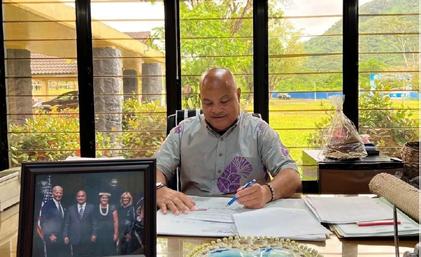
In last minute motion to reconsider Elnei argues that ruling misses the point
By Bill Jaynes
The Kaselehlie Press
January 16, 2022
Pohnpei—On January 10, 2023, Associate Justice Robert Nakasone of the Pohnpei Supreme Court held an apparently closed-door hearing in his chambers to hear arguments between Christina Elnei and Election Commissioner Heinrick Stevenson regarding the necessity for a run-off election for the position of Lt. Governor. On January 12, Nakasone ruled that
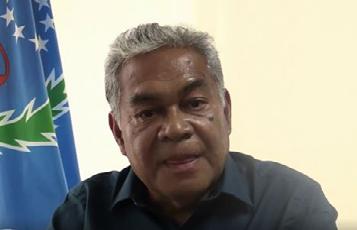
since neither Elnei nor her opponent Francisco Ioanis had received a majority of the votes plus one, the Constitution required there to be a run-off election. Because of the ruling, that election will take place on January 17, the day before The Kaselehlie Press publishes.
However, Elnei had argued that run-off elections are required only for General Elections and are not required in the case of special elections. She argued that the Constitution specifically leaves that
question to statute, and the statute establishes no mandate for a runoff election after a special election such as the one to fill the seat vacated with the untimely passing

Click here for continuation
PUC CEO says that customers should not expect much change in cash power rate until February 15
By Bill Jaynes The Kaselehlie Press
January 14, 2023
Pohnpei—According to Pohnpei Utilities Corporation CEO Nixon Anson, PUC customers should not expect to see any significant cash power tariff reductions until February 15, 2023. He said that PUC did not experience any reduction in fuel invoices until December 29, which

will have little effect on the tariff rate PUC charges that will be announced on January 15.
On November 28, 2022, FSM President David W. Panuelo signed an emergency regulation implementing Public Law 22-139. Under that law, Pohnpei’s share of taxes are to be “remitted to fuel wholesalers for the purpose of providing a fuel subsidy on gasoline, diesel,
and kerosene to Pohnpei residents.” The Office of the President immediately issued a press release indicating that residents of Pohnpei should begin to see a substantial reduction in the per kilowatthour price of cash power.
Click here for continuation
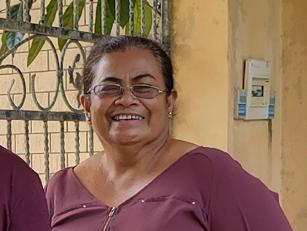
KASELEHLIE PRESS The Free bi-weekly publication PO Box
FM
Kpress@mail.fm www.kpress.info January 18, 2023 Vol. 23 Issue No. 04
2222 Kolonia, Pohnpei,
96941
Photo by FSM Information Services
Francisco Ioanis
Christina Elnei
of Feliciano Perman.
Nakasone ruled that for a candidate
Defendant in Bergeron murder case found guilty
By Joyce McClure Pacific Island Times

One of the two defendants in the killing of Yap’s former acting attorney general, Rachelle Bergeron, was found guilty of murder charges.
Yap State Court Associate Justice Jonathan M. Tun issued the verdict Thursday, convicting Anthony Tun Teteeth who was implicated in the Oct. 14, 2019 incident that shocked the community and made international headlines.
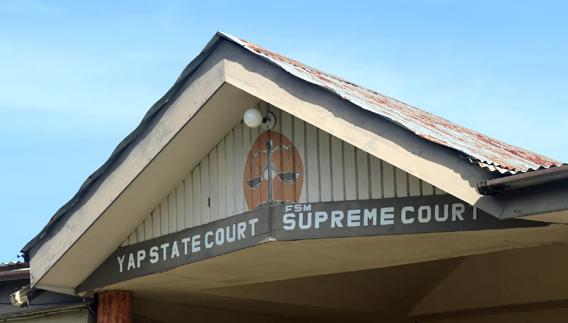
Bergeron received three fatal shots after returning home from jogging along with her dog, which also died in the shooting.

"As gruesome as it may seem, the court is left with the only conclusion possible: that defendant did intentionally cause the death of Rachelle Bergeron," the court said, citing the fatal gunshots sustained by the American lawyer, as well as the damage to the government house and the victim's vehicle.
In response to the defense attorney's argument that Tun's intention was just "scare the victim," the court pointed out that "there is a whole wide range of acts that defendant could have taken to effect the scaring of the victim without using a shotgun, firing three times, while aiming at the victim."
Tun was charged on Nov. 20, 2019 along with Francis Choay Buchun, who was named coconspirator.
The case took more than three years to conclude due to the FSM’s closed border during the pandemic.

conspiracy to commit murder, murder, manslaughter, negligent homicide, and assault with a dangerous weapon, among others.

He was acquitted of charges of threats, criminal coercion, and threats to influence official matters.
The judge has yet to set a date for sentencing, but it is usually two to three weeks after the verdict is read, according to court procedures.
Under the Yap State Code, murder is punishable by 10 years to life imprisonment, or a maximum fine of $10,000—or both.
Buchun was charged with 19 identical counts. Closing statements in his trial were made in court last week.
Yap State’s Chief Justice Cyprian Manmaw is expected to hand down a verdict on Buchun on Jan. 13.
The prosecution, led by the government’s attorney, Jeffrey S. Tilfas, maintained that the two defendants “acted in concert” to plan and execute “the violent act.”
The FSM Supreme Court will hear the defendants’ cases for two violations of ammunition and weapons acquisition and/or possession in February.
Tun was slapped with 19 charges including
More details to follow.
The Kaselehlie Press January 18 - 31, 2023 2 The Your Newspaper for Today and Tomorrow P.O. Box 2222 Pohnpei, FM 96941 ph:(691) 320-6547 email: Kpress@mail.fm Bill Jaynes Managing Editor Kaselehlie Press THE NEXT ISSUE OF THE KASELEHLIE PRESS WILL BE RELEASED ON: February 1, 2023 Deadline for submission of articles or advertisements for this issue is the end of working hours on: Monday, January 30, 2023
Rachelle Bergeron
Coast Guard Cutter Frederick Hatch completes patrol in Oceania
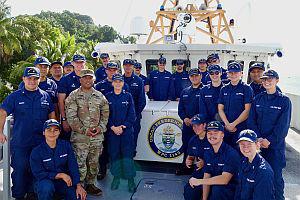
Jan 6th, 2023

SANTA RITA, Guam — The crew of the U.S. Coast Guard Cutter Frederick Hatch (WPC 1143) completed a 41-day 7100-nautical mile expeditionary patrol throughout Oceania on Dec. 23, returning home in time for Christmas.
Under Operations Rematau and Blue Pacific, this patrol countered illegal, unreported, and unregulated fishing in the exclusive economic zones of the Federated States of Micronesia, the Republic of the Marshall Islands, and the Republic of Nauru by enforcing applicable laws, regulations, and individual countries’ sovereignty. The crew strengthened partnerships through established bilateral maritime law enforcement agreements, shiprider operations, subject matter exchanges, and community engagements.
“This patrol exemplified the operational advantage the Fast Response Cutter provides the Coast Guard in Oceania, displaying our ability to successfully complete fisheries enforcement and search and rescue missions over 1,800 nautical miles from home. Mixed with fantastic port calls and impactful community relations events, the last 41 days were a testament to the Hatch crew’s adaptability and diligence that made this patrol so successful. It has been an honor to sail with each of them. Making it home for Christmas is a great reward, especially after being away for Thanksgiving,” said Lt. Patrick Dreiss, USCGC Frederick Hatch’s commanding officer.
The crew hosted students from high schools and colleges as well as community members during their port calls to share the missions of the U.S. Coast Guard and provide a look at the ship itself. They also participated in local sporting events and cultural activities. When departing the Republic of the Marshall Islands, the team took on an additional temporary crewmember, Staff Sgt. Gary Likiak, U.S. Army, and part of the local embassy team. Likiak rode along to Kosrae, which is also home for him – the first time he’s been home in six years.
“Reinvigorating our bi-lateral agreements with our partners in the region after COVID-19 was the main objective of this patrol, and our successes with shipriders aboard and warm hospitality received at each island both allowed us to achieve this goal,” said Dreiss.
Of note, on this patrol, the Frederick Hatch team hosted shipriders from the maritime enforcement branches of the FSM, RMI, and Nauru governments. This activity was the first time shipriders could accompany U.S. Coast Guard crews in several years
as Pacific Island partners resume normal operations after limiting travel as a COVID precaution.
The team conducted 16 boardings, issued five warnings, and found no significant violations. The fishing vessels were tuna longliners and purse seiners.
On Dec. 17, the Frederick Hatch crew, after departing Kosrae, enacted the newly expanded agreement for maritime law enforcement operations, conducting two boardings on licensed fishing vessels operating in the FSM exclusive economic zone.
The crew of the USCGC Frederick Hatch (WPC 1143) arrive in Kosrae, Federated States of Micronesia, on Dec. 15, 2022, and also brought Staff Sgt. Gary Likiak, U.S. Army and part of the local FSM embassy team, home for the first time in six years. (U.S. Coast Guard photo)
to get a shiprider out to the field.”
Association members and party to the South Pacific Tuna Treaty, as is Nauru.
“It was very fulfilling to have an opportunity to enact the Expanded Maritime Law Enforcement Agreement for the first time after watching the program develop over the last year,” said Dreiss. “It provides the U.S. Coast Guard with another avenue to support our regional partners and continues to lay the groundwork for increasing Illegal, Unregulated, and Unreported Fishing enforcement in the region.”
The expanded agreement builds on the existing bilateral shiprider agreement between the two countries. It establishes procedures for authorizing the U.S. to conduct maritime law enforcement boardings on behalf of FSM to combat illicit maritime activity when an FSM law enforcement officer is not present. More specifically, the agreement provides a coordinating mechanism and process for U.S. law enforcement personnel to work with the FSM National Police, Division of Border Control and Maritime Surveillance to receive approval from the FSM to act under the agreement.
“This was an excellent warm-up of our bilateral relations and fisheries enforcement process following COVID. It was great to have local experts with us again and provide services to our FSM, RMI, and Nauru partners,” said Capt. Nick Simmons, the commander of U.S. Coast Guard Forces Micronesia/Sector Guam. “The successful application of the expanded agreement now allows us to support our partners better. FSM occupies more than one million square miles of the Pacific Ocean and ranges 1,700 miles from West (Yap) to East (Kosrae) with the enforcement team in Pohnpei. This agreement allows us to help our partners overcome the logistics that limited enforcement in the past when it is difficult
The U.S. Coast Guard flags IUU-F as one of the top threats to our oceans and a significant regional destabilizing factor. The United States continues to emphasize the ocean’s health and good governance, as evidenced by expanded measures to combat illegal fishing in the FY2023 National Defense Authorization Act. Notable items include an expanded High Seas Drift Net Act, improvements to NOAA’s Seafood Import Monitoring Program, programs aimed at reducing the impacts of ships and other vessels on marine mammals, and a federal ban on buying or selling shark fins in the U.S.
The U.S. Coast Guard regularly exercises 11 bilateral fisheries law enforcement agreements on behalf of the United States with countries throughout the Pacific islands. Shiprider agreements allow maritime law enforcement officers to observe, board, and search vessels suspected of violating laws or regulations within a designated EEZ or on the high seas. These law enforcement activities bolster maritime law enforcement operations and maritime domain awareness and provide a mechanism to conduct integrated operations within the Pacific. This expanded agreement is the first of its kind. It seeks to overcome the challenges of the Oceania region’s vast distances while leveraging limited enforcement resources and the trust built between nations over decades.
The U.S. Coast Guard maintains strong partnerships with the maritime forces in the region through extensive training and subject matter expert exchanges. FSM, also known as the Big Ocean State, has one of the world’s largest EEZs, with waters rich in sea life. RMI, located halfway between Hawaii and Australia north of the equator, is an archipelago of 29 atolls, five low coral islands, and 1,151 islets that shares maritime borders with FSM, Kiribati, and Nauru.
RMI’s exclusive economic zone of 1.2 million square kilometers (463,322 square miles). Nauru is the smallest island nation and the third smallest country in the world, with around 10,000 inhabitants. Fishing is essential to their food security. FSM and RMI are signatories to a Compact of Free Association with the United States. They are Pacific Islands Forum Fisheries
In addition to fisheries enforcement, the Frederick Hatch crew conducted a search and rescue case medically evacuating a 31-year-old Vietnamese fisherman to a higher level of medical care in Pohnpei on Nov. 20.
The cutter’s boarding team learned of the fisherman’s injuries while conducting a bilateral fisheries boarding with an FSM Marine Police Officer aboard the fishing vessel Ocean Galaxy 195 nautical miles (224 statute miles) south of Pohnpei. The ship is a 69.4-meter (227-foot) purse seiner flagged out of Nauru. The fisherman reportedly fell 12 feet earlier the same day, sustaining a head and possible spinal injury. He was conscious and talking but lost feeling and motion in his right arm and both legs, exhibiting severe concussion symptoms.
“It was an absolute team effort by every member of Frederick Hatch to medevac the injured crewmember from the Ocean Galaxy successfully. Witnessing each crewmember perform at the highest level after completing two boardings earlier the same day to help a fellow mariner was awesome to watch,” said Dreiss.
Operation Rematau is how U.S. Coast Guard Forces Micronesia/Sector Guam supports the overarching Coast Guard endeavor Operation Blue Pacific to promote security, safety, sovereignty, and economic prosperity in Oceania. Rematau means people of the deep sea. It recognizes the wisdom of the Pacific Island Forum leaders in that securing the future requires long-term vision and a carefully considered regional strategy for the Blue Pacific Continent. Op Rematau reinforces U.S. commitment to working together to advance Pacific regionalism based on the Blue Pacific narrative. This action supports U.S. national security objectives, bolstering regional maritime governance and security.
The Frederick Hatch is the 43rd 154-foot Sentinel-class fast response cutter named for a surfman and lighthouse keeper who was a two-time Gold Life Saving Medal recipient. The Service commissioned the ship along with its sister ships, Myrtle Hazard (WPC 1139) and Oliver Henry (WPC 1140), in Guam in July 2021. These cutters are a vital part of the U.S. Coast Guard’s enduring regional presence serving the people of the Pacific by conducting 10 of the Service’s 11 statutory missions with a focus on search and rescue, defense readiness, living marine resources protection, and ensuring commerce through marine safety and ports, waterways, and coastal security.
January 18 - 31, 2023 The Kaselehlie Press 3
Coast Guard News
...Pohnpei Cashpower
Continued from front page
“We’re looking at a subsidy of $1.54 per gallon,” President Panuelo said in a statement reported in the press release, “and so—if the current rate of power in Pohnpei is 61 cents per kilowatt hour, residents will save 29 cents, resulting in a price of about 32 cents per kilowatt hour. In other words, if your power bill today is $100 for the month, you are going to be looking at paying about $50 for the same amount of power, thus allowing you to put more money towards gas for your car, groceries for your family, Christmas presents for your kids, and just to help each other during this rough economic period.”
The press release announced that the subsidy would take effect immediately and that it would be in place for the remainder of Fiscal Year 2023, which is September 30, 2023.
On December 1, Anson wrote a letter to President Panuelo saying that quoting a fixed rate of reduction of 29 cents is misleading to the public as the tariff as “PUC’s calculation is based on fuel usage per month.”
During an interview on January 13, Anson explained that PUC announces cash power tariff rates on the 15th of every month. He said that the tariff rate is based on invoices for fuel for the previous month. Because between December 1 and December 31, fuel invoices were essentially the same as the previous month, customers will barely notice the tiny drop in the tariff rate that will be posted on January 15. He said that fuel invoices for the month of December did not drop at all as a result of any reported subsidy until December 29, and they continued to be lower through December 31. Anson did not say how much lower those invoices were but indicated that it seemed to be the start of the effect of the fuel subsidy that the FSM President had announced in late November.
If invoices continue to be lower as the result of the subsidy through the month of January, PUC will reflect those changes on February 15. Until then, cash power customers can expect to pay a rate that is only lower by a factor of a decimal point or two.

U.S. Coast Guard, FSM exercise, execute boardings under expanded Bilateral Agreement
By Homeland Security Today
January 12, 2023
Members of U.S. Coast Guard Forces Micronesia/Sector Guam and the U.S. Coast Guard 14th District conducted meetings and a tabletop exercise in Pohnpei the week of Dec. 12 around the use of the expanded bilateral agreement in support of maritime law enforcement operations recently signed between the Federated States of Micronesia and the United States in October, before successfully executing boardings under the agreement Dec. 17.
“We are so pleased to be strengthening our trust and partnership with our colleagues in the Federated States of Micronesia to overcome complex challenges to maritime enforcement in the region,” said Capt. Nick Simmons, commander of U.S. Coast Guard Forces Micronesia/Sector Guam.
“FSM is a nation with over six hundred islands, and covering that area with available patrol vessels is a challenge. We frequently patrol the region with our Fast Response Cutters from Guam. Still, it can be quite a logistical undertaking to get an FSM marine police officer from Pohnpei aboard a patrol vessel in time to respond to a possible illegal fishing situation, particularly farther out in Yap or Kosrae states.”
The purpose of the tabletop exercise was to walk through the process of using the standard operating procedures under the expanded agreement. The team met with local government members, including the judicial and law enforcement branches. Then on Dec. 17, the crew of the USCGC Frederick Hatch (WPC 1143), after departing Kosrae, successfully conducted two boardings on licensed fishing vessels operating in the FSM exclusive economic zone with FSM’s approval.
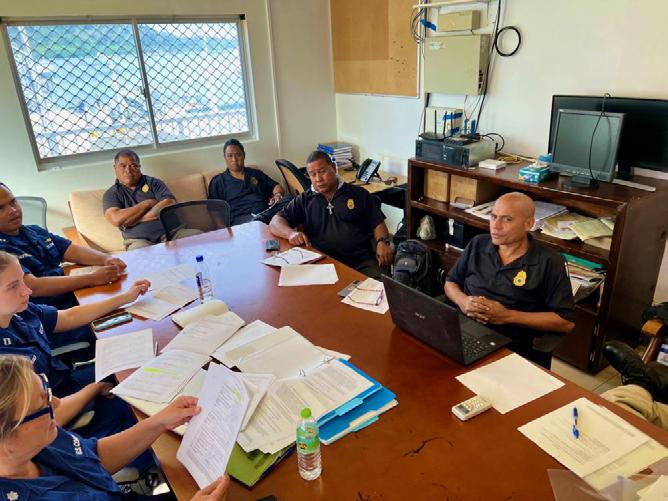
“It was very fulfilling to have an opportunity to enact the procedures under the expanded agreement for the first time after watching the program develop over the last year,” said Lt. Patrick Dreiss, USCGC Frederick Hatch commanding officer. “It provides the U.S. Coast Guard with another avenue to support our regional partners and continues to lay the groundwork for increasing Illegal, Unregulated, and Unreported Fishing enforcement in the region.”
The expanded agreement builds on the
existing bilateral shiprider agreement between the two countries. It establishes procedures for authorizing the U.S. to conduct maritime law enforcement boardings on behalf of FSM to combat illicit maritime activity when an FSM law enforcement officer is not present. More specifically, the agreement provides a coordinating mechanism and process for U.S. law enforcement personnel to work with the FSM National Police, Division of Border Control and Maritime Surveillance to receive approval from the FSM to act under the agreement.
The U.S. Coast Guard regularly exercises 11 bilateral fisheries law enforcement agreements on behalf of the United States with countries throughout the Pacific islands. Shiprider agreements allow maritime law enforcement officers to observe, board, and search vessels suspected of violating laws or regulations within a designated EEZ or on the high seas. These law enforcement activities bolster maritime law enforcement operations and maritime domain awareness and provide a mechanism to conduct integrated operations within the Pacific. This expanded agreement is the first of its kind.
“We’re excited to launch the expanded maritime enforcement operations, which will strengthen FSM sovereignty and protect vital marine resources,” said Alissa Bibb, Chargé d’affaires of the U.S. Embassy in Kolonia.
The U.S. Coast Guard maintains strong partnerships with the maritime forces in the region through extensive training and subject matter expert exchanges. FSM, also known as the Big Ocean State, has one of the world’s largest EEZs, with waters rich in sea life. FSM consists of four states — Pohnpei, Chuuk, Yap, and Kosrae — each with a mix of unique peoples, languages, and cultures. FSM is a signatory to a Compact of Free Association with the United States. They are also a Pacific Islands Forum Fisheries Association member and a party to the South Pacific Tuna Treaty.
As part of Operation Rematau and Operation Blue Pacific, the crew of the USCGC Frederick Hatch is conducting an expeditionary patrol through the Federated States of Micronesia, the Republic of the Marshall Islands, and Nauru. In late November and early December, their efforts resulted in six at-sea boardings of fishing vessels with an FSM shiprider aboard and noted no significant violations. This activity was the first time in several years an FSM shiprider could accompany U.S. Coast Guard crews as the country resumes normal operations after limiting travel as a COVID precaution. The shiprider returned to Pohnpei before the cutter crew departed for RMI and Nauru, where the
The Kaselehlie Press January 18 - 31, 2023 4
The U.S. Coast Guard maintains strong partnerships with the maritime forces in the region through extensive training and subject matter expert exchanges.
Continued on next page
U.S. Coast Guard and FSM Maritime Wing members conduct a tabletop exercise to test the mechanics of using the enhanced shiprider agreement in Pohnpei, FSM, Dec. 1215, 2022. (U.S. Coast Guard photo)
team went on to conduct boardings with shipriders from those countries.
“This was an excellent warm-up of our bilateral relations and fisheries enforcement process. It was great to have local experts with us again, refresh everyone’s memory, and provide services to our FSM partners,” Simmons said. “The successful application of the expanded agreement now allows us to support our partners better. FSM occupies more than one million square miles of the Pacific Ocean and ranges 1,700 miles from West (Yap) to East (Kosrae) with the enforcement team in Pohnpei. This agreement allows us to help our partners overcome the logistics that limited enforcement in the past when it is difficult to get a shiprider out to the field.”
U.S. Coast Guard Forces Micronesia/ Sector Guam crews conducted regular patrols in FSM’s EEZ during COVID and provided sighting reports but could not board vessels in the EEZ without an FSM shiprider along. The Frederick Hatch crew was in Pohnpei in early 2022 for a no-contact replenishment while on patrol in the EEZ. The USCGC Oliver Henry (WPC 1140) crew kicked off Operation Rematau in October with a nearly 2,000 nautical mile deployment to the high seas and the Federated States of Micronesia, countering illegal fishing through their presence and strengthening partnerships through community engagements.
Operation Rematau is how U.S. Coast Guard Forces Micronesia/Sector Guam
... Special Election
Continued from front page
to have won the special election to fill the Lt. Governor’s seat, that candidate would have had to have garnered at least 50 percent plus one of the total votes cast. In this case, there were 8616 votes cast, so a winner would have to have earned 4,309 votes. None of the candidates had that many votes. Elnei had a plurality of the votes with 3,241 but not a majority of the votes.
Judah Johnny, Pohnpei’s Acting Attorney General argued that there is a conflict between the Constitution and statutes regarding special elections and that where such a conflict exists, the Constitution always prevails. Nakasone agreed but did not address the conflict itself, saying that it was outside of the scope of the relief for which Elnei had sought.
“The Supremacy Clause, Art. 2. Of the Pohnpei Constitution provides that the Constitution is the supreme law of Pohnpei; and that any act of government in conflict with the Constitution is invalid to the extent of the conflict,” Nakasone’s ruling wrote. “As mentioned earlier, the Court notes that there is a variation
supports the overarching Coast Guard endeavor Operation Blue Pacific to promote security, safety, sovereignty, and economic prosperity in Oceania. Rematau means people of the deep sea. It recognizes the wisdom of the Pacific

between Article 9, Section 4 of the Pohnpei Constitution and Title 10, Chapter 6, Section 103(1) of the Pohnpei Code; however, the Court will not address the constitutionality of the law at this time since it is not the subject of this action.”
However, on January 13, Elnei’s attorney filed a motion for reconsideration, essentially saying that the Court had misunderstood the relief sought in her petition for a declaratory judgment. “On pages 3 and 5 of the order, the Court stated that the Petitioner seeks an order declaring that she received majority votes of cast votes, thus eliminating the necessity of a run-off election. That is not so. Instead, the Petitioner seeks to have the Court declare that arunoff election is not required by law for special elections; that a run-off election would deny Petitioner her due process rights because it is not required by law; and for injunctive relief.”
The motion for reconsideration also pointed out Elnei’s belief that there is not conflict between the Constitution and the election laws. “Turning back to Art. 9, of the constitution, Section 6(3) states that ‘[s]tatute shall provide for the filling of the vacancy when the office of the Lieutenant Governor
Island Forum leaders in that securing the future requires long-term vision and a carefully considered regional strategy for the Blue Pacific Continent. Op Rematau reinforces U.S. commitment to working together to advance Pacific
Spay and Neuter Clinic
is vacant.’ (Emphasis added)… Furthermore, Art. 9, Section 6(1) specifically provides that the Lieutenant Governor becomes the Governor when there is a vacancy in the office of the Governor, but leaves the vacancy of the office of the Lieutenant Governor to the state legislature under Section 6(3); and the statute adopted by the state legislature does not require a run-off for special elections. Once again, using the Respondent’s logic and reasoning (which suggests a conflict between the statute and the constitution exists) would mean that Art. 9, Sections 4 and 6(1) of the constitution are also inconsistent and in conflict, because the Lieutenant Governor would be allowed to be seated as Governor without a run-off let alone an election. Thus, to summarize, special elections are to be governed by statute as mandated by the constitution, and run-off elections are a requirement only for general elections but not special elections since the special election provisions do not require it.”
At press time, the Court had not issued any reversal or statement regarding the motion to reconsider. Elnei’s attorney says they intend to pursue the matter so that there will be no question when the next special election occurs.
regionalism based on the Blue Pacific narrative. This action supports U.S. national security objectives, bolstering regional maritime governance and security.
1/29/23 - 2/7/23
A team of two veterinarians and two nurses from Guam will be conducting a spay and neuter clinic. The clinic will be open at the New Tokyo Medical College from Sunday January 29, 2023 until the team travels back to Guam on February 7,2023.
To be able to provide this subsidized service we need your donations of money, frequent flyer miles or even old towels and blankets or help at the clinic.
Please email: kidioangoahng@gmail.com or lisabarrow96941@gmail.com to organize a donation or to make an appoint-ment to have your pets spayed or neutered.


January 18 - 31, 2023 The Kaselehlie Press 5
...USCG
Continued from previous page
Embassy of the United States of America

Vacancy Announcement: VA2023.001
POSITION TITLE: Strategic Content Coordinator (Media and Alumni)
OPENING PERIOD: January 17, 2023, to February 17, 2023 SERIES/GRADE: FSN-8 SALARY: USD $17,453.00
FOR COMPLETE INFORMATION AND JOB DESCRIPTION VISIT: • fm.usembassy.gov/embassy/jobs/ CONTACT THE HUMAN RESOURCES
OFFICE:
• KoloniaHumanResourceRequests@ state.gov
DUTIES: The Strategic Content Coordinator (Media and Alumni) works under the direct supervision of the Public AffairsOfficer (PAO) or PAO designee. The position has no supervisory responsibilities. Monitors press and digital media coverage of issues of importance to the United States. Identifies and advises the PAO (or PAO designee) on strategies for promoting accurate and balanced FSM press and digital media coverage of U.S. foreign policy and American interests, correcting misinformation and countering disinformation. Maintains Mission flagship digital properties (social media, website content). Researches and analyzes audiences for Mission digital properties and customizes online engagement to promote Mission objectives. Builds productive relationships with working-level press and media professionals in person and online. Creates compelling visual content for all Mission outreach materials by assessing visual aspects of the FSM media environment, public preferences for visual content formats and dissemination channels, and the impact of Mission visual materials. Designs, plans, and implements a broad range of activities to maintain contact with alumni of all Emerging Voices (EV) and Established Opinion Leaders (EOL) activities and initiatives. Develops strategies for engaging alumni over the long term and analyzes the effectiveness of various exchange programs in achieving Mission goals; recommends adjustments accordingly.
EDUCATION: A university degree in Journalism, Communications, International Relations, Political Science, Marketing, or local equivalent is required.
EXPERIENCE: At least four years of progressively responsible experience in a media outlet, think tank, university, non-governmental organization (NGO), international organization, foreign embassy, government office, or corporation is required, with responsibility for public relations, public affairs, journalism, communications, marketing, outreach events, press conferences, and other media interactions as significant parts of the job.
Experience managing digital properties and with content creation in multimedia and traditional formats, including photography and videography, is required.
LANGUAGE: Level 4 (Fluent) Speaking/ Reading/Writing in English is required. (This may be tested.)
Selected applicant under consideration will be required to pass medical and security certifications.
EQUAL EMPLOYMENT
OPPORTUNITY (EEO): The U.S. Mission provides equal opportunity and fair and equitable treatment in employment to all people without regard to race, color, religion, sex, national origin, age, disability, political affiliation, marital status, or sexual orientation.
FEDERATED STATES OF MICRONESIA DEPARTMENT OF HEALTH AND SOCIAL AFFAIRS
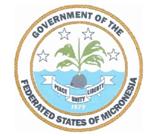
CALL FOR APPLICATION
The FSM Department of Health and Social Affairs (FSMDHSA) is announcing the availability of fellowship or scholarship for those interested in health (medicine, dentistry, pharmacology, public health, mental health, and other related fields). The funding is made available from the World Health Organization (WHO). Those interested must send an email to health@fsmhealth. fm or contact the numbers below. The applicant must submit a completed WHO Fellowship Application form and transcripts.
Department of Health and Social Affairs
FSM National Government Palikir, Pohnpei FM 96941 Phone: 691 320 2619 Fax: 691 320 5263 Email: health@fsmhealth.fm
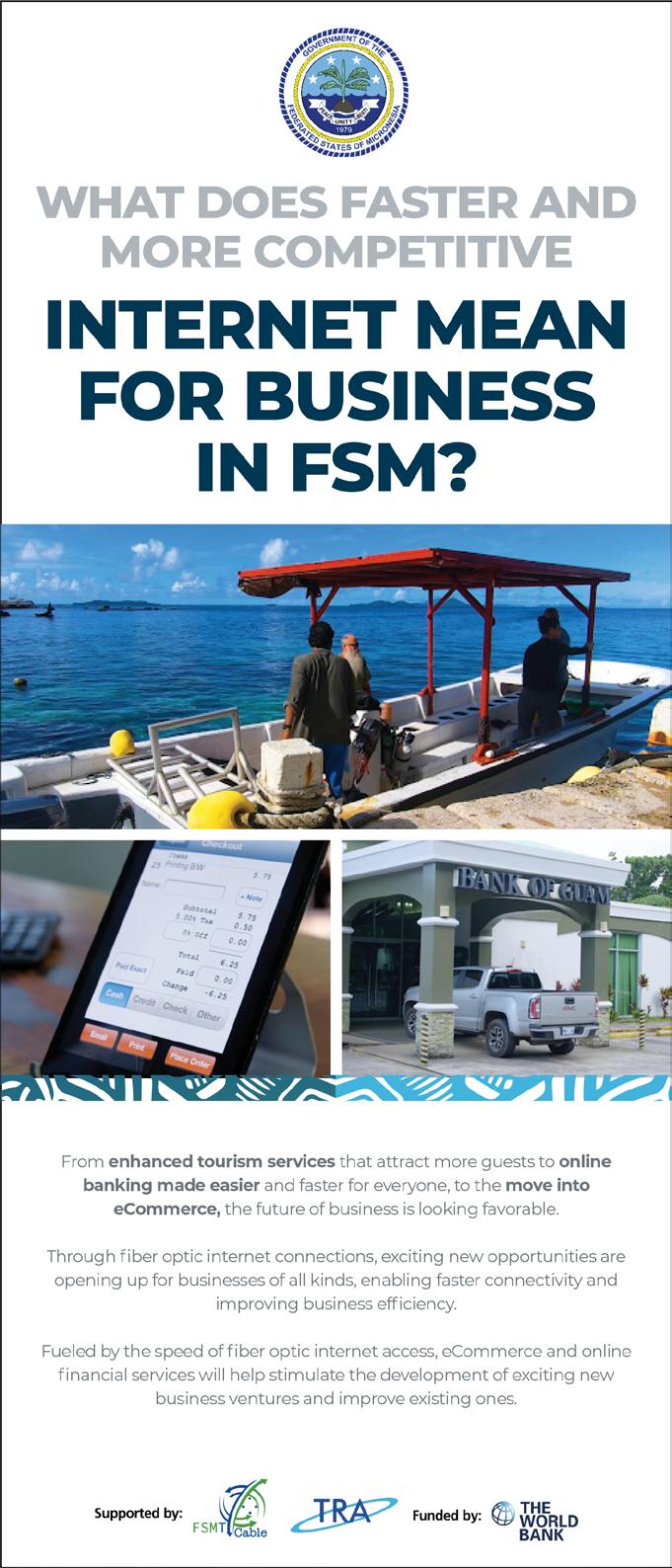

Please note that the applicant must apply and be accepted into Fiji National University (FNU). Although high school graduates with exceptional academic achievement can be considered, applicants with two-year degree in science or related fields are encouraged to apply.
Deadline to submit all required documents is December 15th of each year.
The Kaselehlie Press January 18 - 31, 2023 6
FSM takes further step in securing its Maritime Boundary and Continental Shelf claims by joining the 21st Maritime Boundaries session in Sydney, Australia
FSM Information Services
PALIKIR, Pohnpei— The Government of the Federated States of Micronesia (FSM) fielded a technical and legal team to the 21st Maritime Boundaries Session in Sydney, Australia (“Sydney Session”), to join the regional discussions about maritime boundaries and continental shelf issues. The Sydney Session was organized by the Secretariat of the Pacific Community and the Pacific Maritime Boundaries Consortium of Partners, including the Office of the Pacific Ocean Commissioner (OPOC), the Forum Fisheries Agency (FFA), Geoscience Australia, the Australian Attorney General’s Department, the Australian Department of Foreign Affairs & Trade, New Zealand Ministry of Foreign Affairs & Trade, GRIDArendal/UNEP, the Commonwealth Secretariat, the European Union, the Government of the United Kingdom, and the University of Sydney.
The Sydney Session was instrumental in the delivery technical assistance to the Pacific Region towards a successful conclusion of member countries’ Maritime Boundaries negotiation, the signing of boundary delimitation treaties, and registering those treaties with the United Nations according to the requirements under the United Nations Convention on the Law of the Sea (UNCLOS) and under the UN Charter.
The FSM is a recognized leader in the Pacific Region on Maritime Boundary issues, taking into consideration its successful completion in negotiating all the boundary delimitation treaties—individually with the Republic of Palau, Republic of the Marshall Islands, the Independent State of Papua New Guinea and with the United States of America.
The FSM already filed its Maritime Boundaries with the United Nations— including the comprehensive list of geographical coordinates defining the country’s baselines, territorial sea, contiguous zone and exclusive economic zone—and the illustrative maps and relevant law and regulation that sanctioned these maritime zones. All the delimitation treaties were deposited with the United Nation’s
Division for Ocean Affairs and the Law of the Sea (DOALOS) in accordance with the UNCLOS and with the UN Treaty Section pursuant to the UN Charter. The intention behind these deposits is to ensure that the FSM’s maritime zone remain fixed, stable, legally recognized under international law, and shall remain in perpetuity, notwithstanding the adverse effects of climate changerelated sea-level rise. Assistant Attorney General Leonito Bacalando Jr. delivered a presentation during the Sydney Session on the topic of Preserving the Maritime Zones through the Deposit of Maritime Boundaries with the United Nations according to the UNCLOS.
The Sydney Session also assisted the FSM and other Pacific countries in producing their Extended Continental Shelf (ECS) claims through the cooperative efforts among the Member Countries and the Consortium Partners. Among the successful ECS filings in the Pacific Region, the Ontong Java Plateau (OJP) joint submission by the FSM, Papua New Guinea, and Solomon Islands represents the most successful and inspiring ECS claim covering a vast expanse of continental shelf that goes into the high sea pocket bounded by FSM, PNG, Nauru, and Solomon Islands. The Commission on the Limits of the Continental Shelf (CLCS), a special body established by the UNCLOS to examine ECS submissions, favorably recommended the OJP joint claim in 2018.
Other ECS submissions by the FSM consist of the North of Yap Area filed in April of 2022, the Eauripik Rise claim filed in 2013, and the Mussau Ridge preliminary information filed in 2009. An ECS claim—if favorably recommended by the CLCS—will become part of national jurisdiction subject to FSM laws and regulation. Its implication is that the exploration and exploitation of seabed resources (including minerals, oil, and gas) with respect to the ECS area are granted to the FSM.
During the Maritime Boundary Session in Sydney, the FSM team, comprised of Chief of Law Leonito
Bacalando, Jr, and NORMA staff Alfred Lebehn and Dan Gilmete, conducted critical exchanges of views and discussions with the combined experts from the Secretariat of the Pacific Community, Geoscience Australia, Australian Attorney General’s Department/DFAT and other resource experts organized by the Consortium. The FSM Team also conducted bilateral exchanges with the United States technical team concerning cooperation on maritime boundaries, capacity building regarding ECS submissions, respect for customary international law principles and practices relevant to ECS claims, and the need for data acquisitions. It is to be recalled that the United States registered its noobjection notification in relation to the FSM’s ECS claim over the North of Yap Area lodged with the UN in April this year, and the notification was officially registered with the UN
DOALOS.
The FSM Team also held technical consultations jointly and separately with the technical teams of PNG, Solomon Islands, and Palau to discuss about further cooperation as to the appropriate next steps in the process of securing the OJP claim, including a possible revised submission to be able to present better and more comprehensive scientific data and related areas of further cooperation.
President Panuelo expressed satisfaction on the progress of securing the maritime boundaries of the FSM and of enlarging further the territory of the Nation when it comes to continental shelf claims on the high seas area, most of which are now pending before the United Nations for diligent examination by recognized world experts.
TRADE MARK CAUTIONARY NOTICE

Notice is hereby given that Casella Wines Pty Ltdof Farm 1471 Wakley Rd YENDA NSW 2681 AUSTRALIA, is the sole owner and proprietor in the Federated States of Micronesia and elsewhere of the trade mark below: which is used in connection with the following goods:

Class 32: Beers; ale; lager; porter; stout; fruit ales and beers; non-alcoholic cider; non-alcoholic, low alcohol and de-alcoholised beer and wine; low alcohol and de-alcoholised drinks; ginger beer; malt containing beverages; mineral and aerated waters and other non-alcoholic beverages; fruit beverages and fruit juices; syrups and other preparations for making beverages
Class 33: Alcoholic beverages (except beers); wines and drinks containing wine; cider; alcoholic carbonated beverages; distilled beverages; liqueurs; whisky; pre-mixed alcoholic beverages; spirits; gin, brandy; rum; vodka
Casella Wines Pty Ltd claims all rights in respect to the above trademark and will take all necessary legal steps against any person, firm or corporation counterfeiting, imitating, violating or otherwise infringing its rights in the Federated States of Micronesia.
MUNRO LEYS
Lawyers & Notaries Public, Pacific House, Butt Street, PO Box 149, Suva, Fiji Email: trademarks@munroleyslaw.com.fj www.munroleyslaw.com
MUNRO LEYS
The Kaselehlie Press January 18 - 31, 2023 8


January 18 - 31, 2023 The Kaselehlie Press 9
Medical Waiver Initiative for low-income women, girls, elderly, and persons with disabilities lacking health insurance democratizes access to essential health services
FSM Information Services
PALIKIR, Pohnpei—In late 2022, the Honorable Marcus Samo—Secretary of the Department of Health & Social Affairs—and his staff, signed Memoranda of Understanding with the Departments of Health across Yap, Chuuk, Pohnpei, and Kosrae to signify a shared commitment to advancing social protection measures for the Nation’s most vulnerable citizens. The formal product of these Memoranda of Understanding is the provision of medical waivers for citizens without medical insurance. It is the intent of the FSM Government that this scheme will be of particular benefit to persons and families who are economically disadvantaged, as well as persons with disabilities, children, the elderly, and those who have experienced genderbased violence and/or sexual violence.
The Medical Waiver Initiative is a continuation of the social protection
programming designed by His Excellency David W. Panuelo, President of the FSM. The program is largely funded by the Asian Development Bank (ADB) through ADB’s COVID-19 Pandemic Response Option (CPRO) under the ADB’s Countercyclical Support Facility.
“This is a milestone moment for our Nation,” President Panuelo said in a statement, “As it helps to ensure that cost is not a barrier in accessing medical care, particularly for those who are marginalized or economically disenfranchised.”
Persons wishing to use and/or obtain medical waivers must register at their state hospital. Only persons without medical insurance are eligible for medical waivers. State Governments will ensure that the scheme is accessible to low-income persons with a disability who lack health insurance; low-income elderly/senior citizens, defined as
TRADEMARK CAUTIONARY NOTICE (Micronesia)
Notice is hereby given that our client, San Miguel Brewing International Limited, a company organized and existing under the laws of the British Virgin Islands, with a registered address at Commerce House, Wickhams Cay 1, P.O. Box 3140, Road Town, Tortola, British Virgin Islands, is the owner and sole proprietor of the following trademarks:
TRADEMARKS
SAN MIGUEL SAN MIG LIGHT (word (word)


The said trademarks are used in International Class 032 with respect to the following goods:

“Beer and malt-based beverages”
Our client has instructed us and wishes to bring to the notice of the trade and the public that they attach singular importance to their above-mentioned trademarks. Our client will take all legal proceedings against any person, firm, or corporation counterfeiting, imitating, violating, or otherwise infringing the said rights of our client in MICRONESIA.
Any inquiry relating thereto may be referred to the following: Michelle Miu Epstein, Esq.
MIU EPSTEIN LAW, PC One Park Plaza, Suite 600 Irvine, California 92614 USA
Tel: +1 (949) 688-0268 E-mail: michelle@miuepsteinlaw.com
65 years and older, who lack health insurance; low-income women and girls who lack health insurance; and lowincome children, defined as under 18 years old, who lack health insurance.
Representing Secretary Samo in the signing ceremonies were Mr. Stuard Penias, Assistant Secretary of Social Affairs, and Acting Administrative Officer Ms. Facelynn Perman, and support staff.
TRADE MARK CAUTIONARY NOTICE
Notice is hereby given that Jiang Tai Insurance Brokers Co., Ltd., a corporation organized and existing under the laws of China of 101, Floor 1-12, Building 9#, No. 98 Lianshihu West Road, Mentougou District, Beijing, China, is the sole owner and proprietor in the Federated States of Micronesia and elsewhere of the trade mark below:
which is used in connection with the following services:

Class 36: Insurance brokerage; Insurance underwriting; Insurance consultancy; Insurance information; Securities brokerage; Fund investments; Brokerage; Fiduciary.
Jiang Tai Insurance Brokers Co., Ltd. claims all rights in respect to the above trademark and will take all necessary legal steps against any person, firm or corporation counterfeiting, imitating, violating or otherwise infringing its rights in the Federated States of Micronesia.

MUNRO LEYS
Lawyers & Notaries Public, Pacific House, Butt Street, PO Box 149, Suva, Fiji
Email: trademarks@munroleyslaw.com.fj www.munroleyslaw.com
MUNRO LEYS
The Kaselehlie Press January 18 - 31, 2023 10
USAID provides $99,999 grant award to promote climate-resilient agriculture in Yap
 U.S. Embassy Kolonia
U.S. Embassy Kolonia
January 13, 2023
Yap, Federated States Micronesia–The U.S. government, through the United States Agency for International Development (USAID), announced a $99,999 grant to Catholic Relief Services (CRS) to help farmers in three vulnerable Yap communities earn more through enhanced natural resource management while scaling up climateresilient agriculture.
Through USAID's five-year grant program, the Pacific American Fund, this grant will enable CRS to work with farmers to establish farmers groups, train them on CRS’ globally proven Skills for Marketing and Rural Transformation (SMART) curriculum to identify how to generate market demand, support the transition from subsistence farming to climate-resilient market-based agriculture, and the development of savings and lending communities to increase farmers' access to credit and savings.
"Yap is one of the most vulnerable places on earth to climate
change," said Chargé d'affaires (CDA) Alissa Bibb. "The U.S. government is committed to strengthening the ability of vulnerable Yapese communities by protecting fragile coastal land while generating new nature-based economic opportunities that support livelihood generation and enhance food security."
This award focuses on community engagement and co-creation. It aims to teach the most vulnerable citizens how to lead and respond to future climate-related challenges and reduce the risks associated with disasters. "CRS' deep commitment to strengthening natural resource management through locally driven and deeply contextualized approaches aligns with USAID's Climate Strategy," said CDA Bibb.
Launched in 2020, the Pacific American Fund awards grants on an open and competitive basis to qualifying local, national, and internationally operating civil society organizations, including private small-and-medium enterprises, non-governmental organizations and institutions, universities, and faithbased organizations.
TRADE MARK CAUTIONARY NOTICE
Notice is hereby given that Casella Wines Pty Ltdof Farm 1471 Wakley Rd YENDA NSW 2681 AUSTRALIA, is the sole owner and proprietor in the Federated States of Micronesia and elsewhere of the trade mark below:

CASELLA
which is used in with the following goods:
Class 32: Beers; ale; lager; porter; stout; fruit ales and beers; nonalcoholic cider; non-alcoholic, low alcohol and de-alcoholised beer and wine; low alcohol and de-alcoholised drinks; ginger beer; malt containing beverages; mineral and aerated waters and other non-alcoholic beverages; fruit beverages and fruit juices; syrups and other preparations for making beverages
Class 33: Alcoholic beverages (except beers); wines and drinks containing wine; cider; alcoholic carbonated beverages; distilled beverages; liqueurs; whisky; pre-mixed alcoholic beverages; spirits; gin, brandy; rum; vodka
Casella Wines Pty Ltdclaims all rights in respect to the above trademark and will take all necessary legal steps against any person, firm or corporation counterfeiting, imitating, violating or otherwise infringing its rights in the Federated States of Micronesia.
MUNRO LEYS
Lawyers & Notaries Public, Pacific House, Butt Street, PO Box 149, Suva, Fiji
Email: trademarks@munroleyslaw.com.fj www.munroleyslaw.com
MUNRO LEYS
January 18 - 31, 2023 The Kaselehlie Press 11
UOG joins research efforts toward harnessing energy from the sea
University of Guam
Guam households have historically been paying a high cost of electricity because most power plants on the island still use imported and expensive fossil fuel.
Imagine if seawater could be harnessed to produce hydrogen for electricity in Guam.
Researchers across the country have spent years looking into ways to split seawater, which Guam has an unlimited supply of, into hydrogen and oxygen. It’s a process called "seawater splitting." With the split, hydrogen can be used for producing or delivering electricity.
But using seawater has also stumped scientists because, as National Science Foundation researchers and others have found, chloride ions in seawater turn into toxic chlorine gas, and can quickly corrode equipment used to produce energy.
The challenge has been to figure out how to use seawater in a way that does not harm the environment, will not be costly, and will not cause power production equipment to degrade quickly.

Research related to this field is now reaching Guam shores.
The U.S. Department of Energy (DOE) is providing the University of Guam with funding for faculty and student researchers to
work alongside engineers and scientists at DOE’s Pacific Northwest National Laboratory (PNNL) to gain a fundamental understanding of seawater electrolysis. The research on reductive and oxidative reactions will build a foundation for fundamental research and scientific training at UOG while expanding the fundamental knowledge necessary for carbon-neutral hydrogen fuel generation and storage technologies.
DOE will also fund summer research experience at PNNL’s lab, starting with two UOG students and John Francis Limtiaco, assistant professor of chemistry, in 2023. Five UOG students will be allowed to experience PNNL research during the summer in 2024 and 2025.
$1.69M for UOG
DOE’s Office of Science is providing $1.695 million in research funding to UOG. PNNL will receive $555,000 for the three-year project through 2025. The laboratory is a leading center for technological innovation in renewable energy.
The research at UOG will be led by Limtiaco, who is the principal investigator. His group will seek answers to the question: “Can the organic compounds present in seawater protect the anode from deactivation by steering the selectivity of the electrolysis away from the chlorine evolution reaction while increasing selectivity towards the production of valueadded energy carrier molecules?”
The Office of Research & Sponsored Programs at UOG assisted Limtiaco, who applied for DOE research funding for the first time.
“It was very encouraging to see him commit to this very important project for our island,” said Dr. Pamela Peralta Taitano, Director of Contracts and Grants, UOG.
$400K Ocean Energy Systems research
The Water Power Technologies Office at DOE also recently announced $400,000 in funding, initially for two years, that will be provided toward research at UOG to explore the potential for ocean energy systems (OES), such as ocean thermal energy conversion and wave energy technology, to power a proposed Guam Aquaculture Innovation Center.
UOG will partner with DOE’s PNNL and Sandia National Laboratories to assess the infrastructure requirements, environmental impact considerations and the economic and regulatory viability of deploying ocean energy systems in Guam.
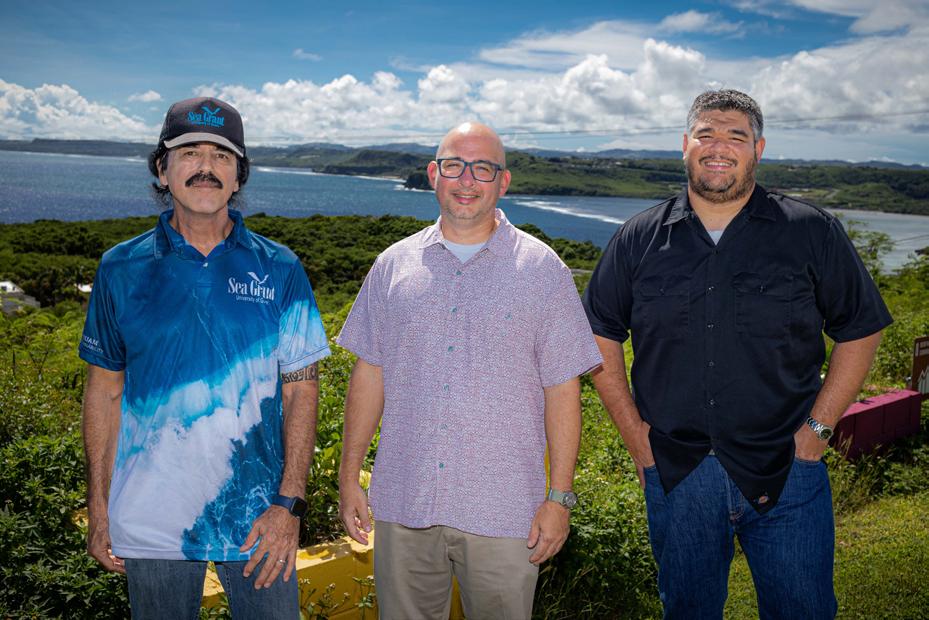
During the initial two years, UOG research will look at obtaining more information to solidify a plan of action for the best option and implementation of a marine energy system, said David Patrick Crisostomo, aquaculture specialist with the Sea Grant Program.
Ocean thermal energy is a strong possibility because Guam has access to deep ocean water relatively close to shore, Crisostomo said. And there is also the possibility for wave energy to be used as a source of energy, he added.
“The long-term dream is an Aquaculture Innovation Center that is reliant on clean energy. The expansion of this dream is to add ocean thermal energy or other marine energy systems to Guam’s ability to produce clean energy for the entire island,” said Crisostomo.
Fleur de Peralta, Senior Advisor with the Risk & Environmental Assessment Group, Energy & Environment Directorate at PNNL, said: “The diversity within the PNNL and UOG teams will strengthen the outcome of both projects as we adapt and learn from each other to gain valuable knowledge on the feasibility of harnessing hydrogen from Guam’s ocean waters and deploying ocean energy systems as additional sources of clean energy for the island.”
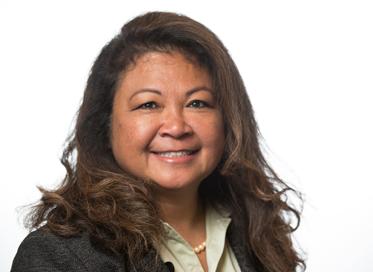
The Kaselehlie Press January 18 - 31, 2023 12
David Patrick Crisostomo, aquaculture specialist at the University of Guam Sea Grant; Bastian Bentlage, associate professor of bioinformatics at the Marine Lab, UOG; and John Francis Limtiaco, assistant professor of chemistry at the College of Natural and Applied Sciences; are photographed on Jan. 12 on campus with Pago Bay in the background.
Photo courtesy University of Guam Fleur de Peralta
President Panuelo provides State of the Nation Address
FSM Information Services
Mr. Speaker, I stand before you, our citizens, and our Nation today, in response to the invitation that you and the Members of the 22nd FSM Congress have so kindly extended to me to deliver the last State of the Nation address for this administration.
I wish to extend my deepest respect and appreciation to you, and all the Members of the 22nd FSM Congress, for your continued leadership and dedication to serving our people of the Federated States of Micronesia. Our Nation, this Paradise in our Backyards, will celebrate this coming May, 2023, a momentous occasion: 44 years of Constitutional Government, and bring in its 10th President and 23rd Congress. I am humbled by your gracious and consistent determination to see to it that our Nation’s greatest
strengths—our peace, our unity, and our liberty—remain at the forefront of all of our deliberations.
Mr. Speaker, I wish for my address to be a report on some of the major work completed during this administration, with additional discussion on programs and activities that are forthcoming and/ or ongoing, as well as those worth pursuing into the future, and ongoing commitments from our Government to our citizens. And to our citizens who are observing today, I ask for your patience because this report will be lengthy!
Mr. Speaker, Given that perhaps the single most impactful situation for our citizens, individually and collectively, during this administration has been the COVID-19 Pandemic, I will begin with our Nation’s victory over the

coronavirus. In early 2020, we all recall, our Government projected the loss of thousands of lives, in addition to significant impacts on our social and economic development platforms. Where other countries failed to put lives and livelihoods first, we succeeded. Through great dedication, across our whole of society, we succeeded at mitigating the impacts of the Pandemic to our People and our economy. Through generous support from the United States, we vaccinated our population. We cannot thank you enough. With generous support from the Asian Development Bank and Congress, we developed our Nation’s first Social Protection Programming. We protected businesses through the $14 million FSM Economic Stimulus Package, which was disbursed to hotels, tour operators, exporters, restaurants, and other businesses that felt the impacts of the Pandemic; this saved hundreds of jobs and by extension
ensured families could continue to survive. This was augmented by the Pandemic Unemployment Assistance (PUA) Program generously provided to the FSM by the U.S. Department of Labor, which provided tens of millions in direct assistance to citizens who became unemployed as a result of the Pandemic. Additionally, we protected families through the $9.3 million LowIncome Household Assistance Program which assisted 9,300 households across the FSM; I remember being in Chuuk with you, Mr. Speaker, and the Governor, distributing those checks which benefited many families and specifically those who do not have access to formal means of income generation. $3 million was provided to the FSM Development Bank to finance the Micro and Small Loans Program, a transformative interest-free program that targeted small businesses. This
See continuation on next page (1)
The United States of America and the Republic of Palau Sign Memorandum of Understanding
Today, the Government of the United States of America and the Government of the Republic of Palau signed a Memorandum of Understanding affirming our close and continuing partnership and reflecting our consensus reached on levels and kinds of future U.S. assistance to be requested for Palau’s economic development.
Special Presidential Envoy for Compact Negotiations Joseph Yun signed the Memorandum for the United States and Minister of Finance Kaleb Udui, Jr. signed for the Republic of Palau.
President Surangel Whipps, Jr. of the Republic of Palau, Senator Rukebai
Kikuo Inabo and Delegate Mengkur Rechelulk from Palau’s Congress, Ambassador Hersey Kyota of the Republic of Palau, and Assistant Secretary for Insular and International Affairs Carmen G. Cantor, U.S. Department of the Interior attended the signing in Los Angeles.
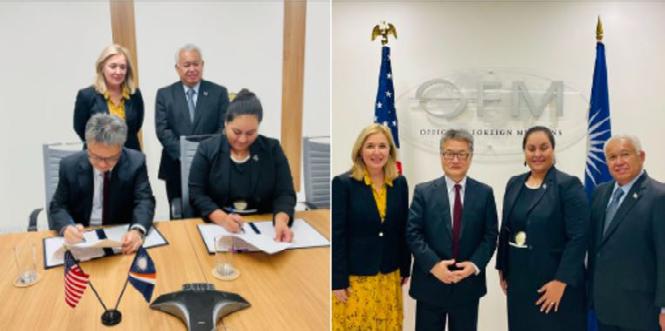
The Memorandum of Understanding was signed as part of ongoing Compact related negotiations and confirms our shared vision for a strengthened and lasting partnership that will continue to benefit both nations and the entire Pacific region.
The United States of America and the Republic of the Marshall Islands sign Memorandum of Understanding
Office of Insular Affairs
Today, the Government of the United States of America and the Government of the Republic of the Marshall Islands signed a Memorandum of Understanding affirming our close and continuing partnership and reflecting our shared understanding reached on levels and types of future U.S. assistance to be requested for the Republic of the Marshall Islands.
Special Presidential Envoy for Compact Negotiations Joseph Yun signed the Memorandum for the United States and Minister of Foreign Affairs and Trade Kitlang
Kabua signed for the Republic of the Marshall Islands.
Ambassador Gerald Zackios of the Republic of the Marshall Islands and Assistant Secretary of Insular and International Affairs Carmen G. Cantor, U.S. Department of the Interior attended the signing in Los Angeles.
The Memorandum of Understanding was signed as part of the Compact of Free Association negotiations and confirms the shared desire to strengthen the special partnership between our nations.
Assistant Secretary for Insular and International Afairs Carmen G. Cantor, RMI Ambassador to the United States Gerald Zackios (standing left to right). Special Presidential envoy for Compact Negotiatons Joseph Yun and RMI Minister of Foreign Affairs and Trade Kitlang Kabua (seated left to right).
January 18 - 31, 2023 The Kaselehlie Press 13
...State of the Nation (1)
produced 280 small businesses throughout the Federation, such as retail stores, truck rental owners, laundromat owners, and small-scale farmers and fishers. I am proud that 57% of these small businesses are owned by women, and the program specifically targeted that at least 50% of these loans would target women.
While it remains terrible, and we can still feel it in our hearts, that hundreds of Micronesians died abroad, it must be said that only dozens died within our own borders, when we knew that—without vaccines and without preparation—COVID could have claimed thousands more as initially predicted by our Government and the U.S. Centers for Disease Control & Prevention. While the coronavirus will continue to be with us, today we can claim our victory over the COVID-19 Pandemic and a return to normalcy.
It is also in this respect, Mr. Speaker, that I wish to highlight the service of both the Late Dr. Livingston A. Taulung as well as that of all of our Nation’s health workers. Dr. Taulung laid the foundation for keeping our Nation COVID-19 free, which Secretary Samo and our Nation’s first responders maintained until this summer. The Late Dr. Taulung is a hero to this Paradise in Our Backyards, as are all of our Nation’s health workers too, and any success that this administration, that this Congress, and that our State Governments can ascribe with regards to the COVID-19 Pandemic ultimately lay at their collective feet. For this, they have our eternal gratitude; and may I ask that we give all of our frontline workers a round of applause?
It behooves me to also emphasize the heroism of our former Vice President—my friend and mentor Yosiwo George. Vice President George dedicated his life to the service of this Nation, and he served the FSM with unquestionable leadership and integrity. He spent his whole life to building our Nation’s prosperity. His leadership, and his friendship—and his insight as well as his foresight, particularly when our Nation faced the COVID-19 Pandemic, was essential to the good decisions that our country
made.
There is but one more piece of work to be done, I believe, Mr. Speaker, regarding the COVID-19 Pandemic. In this regard, I solicit our Congress to reconsider the necessity of the Healthy Border Protection Act in its current form. While vaccines remain the best solution for the goal of preventing severe disease, whether it be from COVID or Measles, I believe we are now at the time where we must allow any FSM citizen, regardless of vaccination status, to come back home on their own terms. The Healthy Border Protection Act has been an essential piece of legislation for protecting our country, but amending it so as to allow FSM citizens to come and go as they please from their own home country is, I believe, equally essential to the continued longevity of our democracy.
As a final comment on issues relating to the COVID-19 Pandemic, Mr. Speaker, we all know and appreciate that the Pandemic paused several of our Nation’s important initiatives and services. Thus, I wish to inform you, our Congress, and our People, that the FSM National Census is wrapping up its preliminary work, which had been delayed due to our prohibitions on international and, oftentimes, domestic travel. I am advised by the Secretary of the Department of Resources & Development that we will be implementing the Household Surveys from the middle of February to the middle of April this year. I encourage all FSM citizens and residents to participate in the Census, which will gather the socio-economic information of households. The census is a fundamental part of our national heritage and collective knowledge, that provides statistics that are essential for planning the provision of healthcare, education, and employment.
Mr. Speaker, Of paramount importance to our Nation-building process is the accrual and positive use of funding from friends, allies, and development partners for the betterment of our citizens’ lives and livelihoods. In this regard, I am pleased to announce that this administration—and this is not an exaggeration—has seen the greatest amount of financial growth and support, as measured by foreign support, in our Nation’s history. Over the course of this administration, and outside of the funding received from the Compact of Free Association—
outside of it—our Nation has received $747,071,963 over the past several years and renumerated or repeated by our ODA and Cabinet. We received $747 million in external donor support, though the figure would be higher if we could financially measure certain forms of in-kind assistance.
Part of this success is due to the improved coordination between the Nation and its development partners since the establishment of the Overseas Development Assistance policy in 2013, and I thank you for that Mr. Speaker and our Congress. But today—may I ask that we give a round of applause to our development partners? Because without the partnership of our foreign partners, this would not be possible.
Our Nation has received over $18.2 million in the Agriculture Sector, $22.4 million in the Climate Change Sector, and $22.8 for Water Security. We received $166 million in the Communications Sector and $100 million for tackling COVID-19 and developing the Social Protection Program. We received $961,260 in the Cultural Development Sector— which is relatively small but highly impactful—and over $28.9 million in the Education Sector. Again, this is outside of the Compact of Free Association. We received over $77 million in the Energy Sector, and $33.9 million in the Fisheries Sector. During this administration, the Nation was able to receive over $20.2 million for improving good governance—and I’ve always said that maintaining the rules-based international order is essential towards maintaining the rule of law—and $35.2 million for the Health Sector. This amount does not include what the nation receives from the Compact Sector Health Grant annually. Furthermore, the Nation has received $157 million for the Infrastructure Sector and $58.46 million for its Transport Sector. The greatest contributors to our Nation’s development initiatives include the United States of America (thank you), the World Bank (thank you), the Asian Development Bank (thank you), the Government of Japan (thank you), The People’s Republic of China (thank you), the European Union (thank you), Australia (thank you), and India (thank you). I would like to extend a special recognition to our NGOs such as the Micronesia Conservation Trust, our regional partners such as SPC, FFA, and SPREP, and the multiple agencies
of the United Nations. The hard work and dedication of these organizations have helped us mobilize more financial and non-financial resources than ever before.
Mr. Speaker, You may recall that, in September 2022, Congress endorsed the six ODA nation-wide priorities (C.R. 22-62). It is my pleasure to provide an update on these priorities and how much ODA has been committed to these priorities. And
• Pave the Nation Initiative: $100 million
• Renewable Energy: $67 million
• Water Security System for FSM: $9 million

• Vocational School: $17.7 million
• Climate Resilient Infrastructure for Outer Islands Transport: No funding secured
• Medical Diagnostic Facility: No funding secured
In response to the priorities that have not secured funding, a Development Partner’s Roundtable is being arranged on the margins of the State & National Leadership Conference tentatively scheduled for April of this year, so as to enable the States and the National Government to convey the pending priorities to our Development Partners.
A supplemental request is submitted to solicit Congress’s support in making this Development Partners Roundtable possible.
Mr. Speaker, At this time, I think it is worthwhile to discuss some of that foreign assistance in greater detail. Many citizens’ experience is hearing that the FSM Government received money on social media—and then that’s it; they don’t know where it goes, and they question where it goes. So it’s valuable for us to discuss some of the assistance the FSM receives from our friends, allies, and development partners, both as a way of thanking them through this address, and as a way of informing our citizens of how the different aid projects impact their respective communities.
Beginning with International Financial Institutions, during this administration we have received approximately $74.3 million from the Asian Development Bank in approved
The Kaselehlie Press January 18 - 31, 2023 14
Continued from page 13 See continuation on next page (2)
...State of
the Nation (2)
projects, with key projects including the $19 million Renewable Energy Development Project that supports Kosrae with 1.6 Megawatts of ground mount and rooftop solar in Tofol, and the first mini-grid system for Kosrae in the remote village of Walung in Tafunsak; a 60-100 kWp system with battery storage, and several solar home systems. Additionally, for Yap, the Project includes 2.0MW of rooftop and ground mount solar, an upgraded utility-wide software communication and control system, and 1.5 MW battery energy storage system; there is also $4 million as a disaster risk reduction component that will support the development of a national energy disaster management plan and the procurement of essential spare parts for utilities; the Renewable Energy Development Project is expected to be constructed and commissioned by mid-2024.
ADB also supports the Chuuk Water Supply & Sanitation Project and, of course, funding for our Nation’s Social Protection Programming, including the Low-Income Household Assistance Program, among others, through the Health Expenditure & Livelihoods Support (HEALS) Program i.e. the COVID-19 Pandemic Response Option. When combined with other projects such as the Climate Resilient Energy & Water Project, and the Pacific Disaster Resilience Program, among so many others, we can continue to count on support from the Asian Development Bank to partner with our Nation in helping us to achieve our needs. In addition, ADB has committed to providing the FSM $25 million as part of the PanueloPalik administration’s Pave the Nation Initiative.
The World Bank is another such partner of the FSM, and there is much to be said of their partnership. We have recently enjoyed the opening of a World Bank office in our country, which will help to ensure that the $173.2 million of approved projects during this administration will reach their maximum potential. These projects are all indicative of this administration’s top priorities, such as the Pave the Nation Initiative to construct climate-resilient roads, and our efforts to improve reliability of electricity supply, expand access to
electricity, and scale up renewable energy so as to increase the FSM’s energy security, and reduce reliance on fossil fuels. Some of these projects include the Prioritized Road Investment & Management Enhancements Project (PRIME) and the Strategic ClimateOriented Road Enhancements Project (SCORE), which are collectively about $75 million in support of the Pave the Nation Initiative. The PRIME project includes urgent priority works, such as the Manta Ray Twin Bridges in Yap, the Lelu Causeway in Kosrae, the one-mile Airport to Pou Bay Road in Chuuk, and the Awak Bridge in Pohnpei. The SCORE Project targets secondary roads, specifically the Dugur to Bael secondary road in Yap, the East and West Pou Loop in Chuuk, the Nahnpohnmal to Sekere Bypass Road and Temwen’s road to Nan Madol in Pohnpei, and the Sialat Bypass Road in Kosrae.
The World Bank also continues to support the FSM through providing upgrades at the Okat, Pohnpei, Tomil, and Chuuk Ports through the $39 million FSM Maritime Investment Project. For the energy sector, 30 million is for the Sustainable Energy Development Access Project (SEDAP). The purpose of this project is to improve reliability of electricity supply, expand access to electricity, and scale-up renewable energy generation. This includes the construction of a new power plant at Nahnpohnmal in Pohnpei, and in Chuuk, additional solar on Weno, the establishment of a mini-grid on Udot, and a hybrid system of both conventional generators and solar system that connect all households on Satawan. In Kosrae, there will be an additional battery storage and control system and, in Yap, a brand-new highspeed generator. These projects will commence construction this year and be completed by 2024.
The European Union FSM-SE is part of the overall Sustainable Energy and Accompanying Measure (SEAM) project funded from the FSM National 11th European Development Fund (EDF). It has a budget of about $11 million. The project is undertaking a review of the 2012 National Energy Policy, development of the FSM’s SDG 7 roadmap, State level consultation toward developing FSM’s Energy Investment Plan, provision of scholarships in the amount of $140,000 for STEM students in their sophomore years and internship, employment
extension for the four state energy officers, 10 outer island sites (Etten, Fefen, Polle, Piis-Paneu, Nama, Moch, Lukuno, Nomwin, Onoun, and Houk) to do detailed feasibility studies, by which two or three of the sites will be solarized in the State of Chuuk, and rehabilitation of the Falalop Ulithi mini-grid in Yap State.
The $ 5 million Micronesia Public Sector Building Energy Efficiency (MPSBEE) Project is funded by GEF/ UNDP. The project has completed all four states’ energy audits on each state’s selected public facilities, and commenced procurement process to retrofit appliances and fixtures. The state facilities include: Pohnpei State Hospital, Pohnpei Governor’s Office, Yap Radio Station and Administration Building, Chuuk State Hospital and Chuuk State High School, Kosrae State High School and Tafunsak Elementary, which will be retrofitted with solar-powered air conditioners. The installation will be completed by the third quarter of next year.
When combined with other essential projects, such as the $30.8 million Digital FSM Project, which includes connecting fiber optic cables to our businesses and communities, as well as the setup of our Digital FSM Office, we can truly see that the World Bank’s support to the FSM’s development remains invaluable. We are seeing the construction and rehabilitation of roads to be Climate-Resilient through the Pave the Nation Initiative, more islands becoming electrified in Chuuk Lagoon and elsewhere, and with the Digital FSM Office, we will see the transfer all ICT-related roles across federal agencies to the office by June 2023, and transition the FSM Government to a single Microsoft information domain, email, and collaboration services environment by December 2023.
Of the possible gaps not addressed by the Asian Development Bank and the World Bank, our Nation has been partnering with the Green Climate Fund, and during this administration we have received two approved projects. We are in fact the only country in the Pacific that has received two grants from the Green Climate Fund. One project is the $19.6 million Climate Change Adaptation Solutions for Local Authorities in the FSM Project, which will empower local communities and Municipal Governments to achieve Climate
solutions. The Green Climate Fund also benefits the FSM through the $9.6 million Climate Resilient Food Security for Farming Households across the FSM Project, which will result in 68,250 direct beneficiaries across our Nation as it will empower farmers and their families to rely less on imported foodstuffs and encourage larger domestic production of healthier local food. Activities include the first FSM-wide baseline vulnerability assessment of the Nation’s entire agricultural system and food security capacity, and the development of farmers’ collectives, and the creation of value-added food, such as organic breadfruit chips sold to our citizens instead of imported potato chips.
Mr. Speaker, All this talk about money could lead one to ask about the performance of our banking system. As to the performance of our own banking system, I am pleased to report that our system is safe, sound, and strong. Capital, liquidity, and profitability remain satisfactory, and this trend is expected to remain solid for the foreseeable future. During the past four years, our banking system’s total assets has increased from $371 million to $476 million. The loan portfolio is presently comprised of 16.6% of the system’s assets, of which 55.8% are commercial loans and 44.2% are consumer loans. Thendeposit portfolio is at $437.9 million and there is no sign indicating a downward trend. But, we need to improve our loan-to-deposit ratio of our commercial banks by increasing domestic commercial loans in order to capture more benefits from the use of bank deposits to fund, and support, high-value business projects and opportunities in-country.
The FSM Development Bank—The President of FSMDB, like myself and our Vice President, is an alumnus of Eastern Oregon University—approved and booked 944 loans totaling $14.4 million in 2021, a 47% increase compared to 2020. Of those 944 loans, 48% were for businesses, and the rest were for home construction and consumer loans. The sectors that were the most impacted were the Tourism and Construction Sectors. The outstanding loan portfolio at the year’s end was $41.8 million.

January 18 - 31, 2023 The Kaselehlie Press 15
In addition to a strong banking system, our Nation is blessed with two Continued from page 14 See continuation on next page (3)
...State of the Nation (3)
Trust Funds—one as a result of our Compact, and one as a result of our own dedication. The Compact Trust Fund is approximately $1 billion at the time of this address, and the sovereign FSM Trust Fund is approximately $400 million, and growing. I thank Congress because we have made smart investments in our country, such as depositing 20% of our fisheries revenues into our sovereign Trust Fund, and 50% of our funds from MRA Advisors Inc. earmarked into our sovereign Trust Fund. Even while we are sleeping, these funds continue to accrue interest for the benefit of our citizens.
Mr. Speaker,
The United States of America, with whom the FSM shares an Enduring Partnership codified through the Compact of Free Association, remains our Nation’s premier friend, ally, and development partner. Beyond ongoing support in the Education & Health Sectors, during this administration we’ve chipped away as much as possible on the existing Compact Infrastructure Sector’s backlog.
For the State of Chuuk, we have received two infrastructure grant awards for the design of dispensaries and schools. Among these, we’ve gone out for bid and awarded contracts for three dispensaries in Romanum, Onoun, and Fonoton totaling $2.7 million. We’ve received a grant award for the construction phase of three Health Centers within Chuuk Lagoon, and of course the $70 million Chuuk State Hospital remains the next big project which JEMCO has recently acknowledged the importance and urgency thereof.
For the State of Pohnpei, we have received infrastructure sector grant assistance towards the Pohnpei Utilities Iron Removal Plant, which was recently dedicated, as well as grant assistance towards the Pohnpei State Emergency Operations Center. More recently, the Project Management Office in Pohnpei has brought onboard a new Program Manager who has issued four projects to bid in the past couple of months, including the $10 million Kinakapw Water Line, $5 million for Lukop Elementary School’s
renovations, $5 million for Palikir Elementary School’s renovations, and $8 million for the Primary Healthcare Facility. We’re on track for Pohnpei’s balance of $80 million in backlog to be fully bidded out by May, 2023.
For the State of Kosrae, we have received two infrastructure sector grants for the Okat Bridge Utility Relocation and the Kosrae Agricultural Facility Projects. Like Chuuk State, we are hopeful that the Kosrae Hospital Project will be in the implementation stage very soon, and through recent communications between myself and Secretary Haaland of the U.S. Department of Interior, there is increased visibility and awareness on behalf of the U.S. Government on the importance of this project moving forward as expeditiously as possible. We are on track to fully obligate the $38 million balance for the Kosrae State Hospital once the grant is awarded, and we are awaiting the award of the grant.
For the State of Yap, we have received infrastructure sector grant awards for the Yap Water Storage Tanks and the Yap Water Supply Projects. For the $6.7 million Woleai Airport project, bids closed on November 30th 2022, and are awaiting final evaluation.
For the $8 million Ganir Bridge, the environmental assessment is ongoing with the design completion expected for October 2023. For the Yap High School, Colonia Middle School, and Woleai High School projects, the procurement approach has shifted to Design-Build, which was sanctioned by the Yap State Legislature to expedite their implementation. An independent Review of Drawings to determine usable details is ongoing before the preparation for a final Request for Proposal for issuance by the end of March 2023. We are on track to fully obligate the remaining balance of $40 million for Yap by March 2023.
Mr. Speaker, With all this talk about money, I believe now is an appropriate segue to discuss our ongoing negotiations on the expiring economic provisions of the Compact of Free Association, as Amended.
The good news is that there is much we have already completed successfully with regards to our Compact’s negotiations. The U.S. Special Envoy for Compact Negotiations, Ambassador Joseph Yun, and I have shaken hands and agreed to an annual
sector grant assistance level of $140 million per year; that represents more than $50 million per year over current assistance levels. I have also made clear that in addition to this sector grant assistance, a onetime contribution of funds into our Compact Trust Fund remains a critical component of our Nation’s economic requirements, and is necessary for the health and sustainability of the fund.
That said, there remains some important work to be done before our Nation’s negotiating teams can sign off. Among these include an agreedupon inflation index; the development of mutually acceptable subsidiary agreements that are appropriate for the next Compact period; the continuation of essential U.S. programs such as Pell Grants; and other important issues, such as updating the Fiscal Procedures Agreement to reflect more deference to the FSM in the management and implementation of funding assistance, and the potential reinstatement of several U.S. Department of Education programs that are invaluable for FSM students. I thank you, Mr. Speaker, and the Chair of our Joint Committee on Compact Review & Planning, for making sure that our Nation is satisfied with the results of our negotiations.
The FSM will work very hard until we are satisfied with all aspects of the agreements between our country and the United States.

Mr. Speaker, Our Nation’s security is the next topic I’d like to address. Philosophically, one could argue that virtually any topic of concern is a security threat, such as access to healthy food at levels that keep our citizens nourished and full, and access to educational programming that keep our citizens literate and critical thinkers. Climate Change, certainly, is what we primarily think of as our topmost security threat—and it remains our Nation’s foremost existential threat—but I’d like to focus on more traditional areas of security for our collective awareness and discussion at this time.
Given the geopolitical atmosphere in the Pacific, one of the results we are seeing, and that our Congress and our citizenry should know about, is increased attention from the U.S. Armed Forces. Among these, we look forward to the expansion of our ports, such as in the State of Yap, and increased presence from the U.S.
Navy Seabees. While most of the attention from the U.S. Armed Forces has positive economic and societal benefits to our Nation, we should also begin to expect an increase in training exercises taking place in and/or around our ocean territory. Of paramount importance is that our Nation’s citizenry be informed in advance when U.S. fighter jets fly over the State of Yap, for example, or when the U.S. practice firing antiaircraft missiles from the ground. These exercises will be increasing in frequency over the next several years, and while they are ultimately in our national interest and in the interest of our Nation’s security—of which the U.S. is our indisputable guardian—it is important that our citizens know about them well in advance so that our people do not see these activities and then immediately fear the worst.
An enduring threat to the FSM has been in the form of illegal, unregulated, and unreported fishing activities in our ocean territory. Last year, the FSM signed a first-of-its-kind expanded shiprider agreement with the United States, which is intended to further operationalize, strengthen, and modernize the existing shiprider agreement. This agreement allows for remote coordination of authorities, and so results in enabling the U.S. Coast Guard to act on the FSM’s behalf in combatting illicit maritime activity. Additionally, the FSM will soon be receiving the second Guardian-class vessel from Australia to replace our previous patrol boats, and we’ll also be receiving four patrol boats donated to us by Japan, one for each of our States, which should have the effect of helping our Nation to defend its sovereignty and its resources.
Another threat to our Nation’s security, which has been on the increase and comes from both State and Non-State actors, is in the arena of cybersecurity and cyber-activity. I am thankful for Congress’ support to our Cybersecurity & Intelligence Bureau (CSIB), a Division of the Department of Justice, and would solicit the Congress’ support for passing our proposed Cybercrimes bill. Our Nation has successfully joined the International Criminal Police Organization (INTERPOL), which helps CSIB carry out its mandate, passing the Cybercrimes bill will be instrumental in helping our country
The Kaselehlie Press January 18 - 31, 2023 16
Continued from page 15 See continuation on next page (4)
to prosecute cybercrimes, of which perhaps the most common we see in our country’s context are scams from Africa and South Asia targeting our Nation’s citizens for money transfers and the like.

The last item I wish to address from a national security lens is the current status of the $70 million East Micronesia Cable Project and our telecommunications sector. Generously funded by the United States, with whom we share an Enduring Partnership, Japan, with whom we share a Kizuna or special bond, and Australia, with whom we share a Trusted Pacific Partnership, the East Micronesia Cable is ultimately the piece of physical infrastructure that will democratize digital communications for the State of Kosrae, as well as for our brothers and sisters in Kiribati and Nauru. Kosrae is the only state without a fiber optic connection, and this project makes that connection possible. After several years of various forms of delays and setbacks, I am advised by the Boards of FSM Telecommunications Corporation and the Open Access Entity that both of these FSM Government entities are fully onboard with the East Micronesia Cable Project. We expect to sign the grant agreements within the coming weeks so that work on this essential project can move forward in an expeditious manner. I thank you, Mr. Speaker, and our 22nd FSM Congress for passing the resolution in support of the East Micronesia Cable Project, as it emphasized that our FSM Government takes this important issue seriously.
In addition to the East Micronesia Cable Project, the FSM looks forward to the entry of Starlink—I was actually communicating directly with Starlink’s staff the other day—into our Nation’s economy with a sample of small satellites during the summer of 2023. Starlink satellites provide internet connectivity to remote places all around the world. It will be in our national interest, including our security interests—such as when our Nation faces king tides, tsunamis, and typhoons—to utilize these and other forms of communications so that our remote communities are able to send and receive information prior to,
during, and after times of crisis.
Mr. Speaker, Our Blue Pacific Continent has undergone substantial growth over the course of this administration. After much discussion and, yes, soul-searching amongst Pacific Leaders, our Pacific Islands Forum has emerged as a stronger and more resilient organization through the Suva Agreement. The sovereign Micronesian countries have found and defended their voice, and we’re now a part of a renewed and strengthened Blue Pacific. For our part, we can expect that the next Secretary-General of the Pacific Islands Forum will serve a five-year term, and will come from Micronesia. We can and should begin the work of interacting with our brothers and sisters in Palau, the Marshall Islands, Nauru, and, yes, Kiribati—who we continue to offer an olive branch to—to determine who that next Secretary-General should be. Additionally, Micronesia will host the Pacific Ocean Commissioner and their office as well as a subregional office for the Pacific Islands Forum. Your FSM Government is exploring how it might become the host of the subregional office for the Pacific Islands Forum.
It is also worth noting, as this is something that Congress and our People can take pride in, is that the FSM played an essential role in crafting the 2050 Strategy for the Blue Pacific Continent alongside our Pacific Brothers and Sisters. This regional strategy comprehensively aligns, and in understandable and human language, what the Pacific believes in, what the Pacific wants, and how the Pacific will get it what wants while supporting, never compromising, its beliefs.
As for the United Nations MultiCountry Office, I am pleased beyond my capacity to express it that our Nation has been blessed with the service of Jaap van Hierden, the United Nations Resident Coordinator for Micronesia. Now that the FSM is host to a United Nations Multi-Country Office for the Micronesian subregion, it is our responsibility to find them a home. For our part, the FSM Government has been working with Pohnpei State Government to help determine the best location for the permanent site of the United Nations Multi-Country Office, as well as possibly several other external development partners. At the time of this address, we are
increasingly interested in the area immediately across from the Embassy of the People’s Republic of China here in Palikir, and/or the site at the botanical garden, and we are working with Pohnpei State Legislature on this. As the host state to our Nation, Pohnpei plays a big obligation in making sure that we are friendly to our development partners and these entities that are in our country to help us with our development.
Mr. Speaker, Our Nation’s foreign policy of being a friend to all and an enemy to none, and a Nation that extends to all peoples and nations that which we seek: peace, friendship, cooperation, and love in our common humanity— has, and continues to, serve us well. Over the course of this administration, our country has shown time and again that, though our population is small, our voice is large. We can all be proud of our Nation’s assertive voice on matters of national, regional, and truly global importance. From recognizing the Honorable Fiame Naomi Mata’afa of Samoa after her swearing-in ceremony, to severing our relations with the Russian Federation due to their brutal and unjustified invasion of Ukraine, and from condemning the former U.S. President for his fascist attempted insurrection, to warning the Pacific Islands’ Leaders of the dangers of China’s Common Development Vision, this Paradise in Our Backyards has shown the World that we jealously guard our sovereignty, as we also jealously guard the Pacific Way of Peace, Unity, and Liberty. We have shown the World, as well as our People, that the Federated States of Micronesia will truly be a friend to all and an enemy to none—but also that, by doing so, we will always act with and for the FSM’s National Interest, and the interests of our Blue Pacific Continent.
Mr. Speaker,
The FSM has formal diplomatic relations with 95 countries—most recently with Bulgaria, Bahrain, and Panama. The FSM is a member of 20 international organizations, and 9 regional organizations. Keeping track of our foreign relationships, and ensuring that these relationships serve our citizens’ interests, remains a core pillar of the work of our Department of Foreign Affairs.
In this regard, I would like to thank Congress for your collective support
in funding our new Consulate Office in Portland, as well as our new Chancery in Tokyo. I am deeply excited about our upcoming trip to Japan in the beginning of February to commemorate the occasion, as well as the opportunity to speak with Prime Minister Kishida. Japan is a close friend and ally of the FSM, and are behind the United States in terms of total foreign assistance given to our country. Thus, the $6 million investment for our Chancery in Tokyo will pay dividends, as it demonstrates in part our Nation’s own commitment to ensuring that our Kizuna, our special bond, only grows stronger with each passing day. Of course, there are also financial benefits to our Nation when we own physical infrastructure abroad instead of renting office space.
That said, Mr. Speaker, I would solicit Congress’ support for considering additional financial support to our Embassy and Consulates in the United States. For Washington DC, we are asking Congress for a $3 million property that will better allow us to serve our citizens. For Honolulu, we are exploring a $5 million property in the downtown area, as the current structure is difficult to get to, dangerous at night, and physically cramped. Particularly since one can plainly see Micronesians, not Americans, in places like Ala Wai Park, it is essential that our Consulate in Honolulu be closer to the citizens that it serves.
I also note that the Government of Switzerland has continued to offer to host an Embassy of the FSM in Geneva for several years. The Executive is requesting approximately $400,000 this session for resuming the necessary work to explore and setup this diplomatic mission, which will allow the FSM to have physical presence in the European Continent, and greater presence at the United Nations.
During the recent bipartisan visit from Australia lead by Foreign Minister Penny Wong, our country reaffirmed our interest to establish an Embassy in Canberra, Australia. While an exploratory mission to Australia is not in the Executive’s supplemental budget request this session, I would deeply encourage the next administration to consider this mission at the nearest opportunity. Australia has been here in our country, and it’s about time that
January 18 - 31, 2023 The Kaselehlie Press 17
Continued from page 16 See continuation on next page (5)
...State of the Nation (4)
...State of the Nation (5)
we reciprocate the establishment of our Embassy in Canberra, and I thank you for that foresight.
Mr. Speaker,
While our Nation’s foreign policy is certainly essential to our development and place in the World, it is reasonable that the bulk of our citizens have their eyes and minds set on home. While I have already covered much of our domestic policy in the form of major infrastructural development, I wish to briefly discuss key legislation during this administration that impacts our citizens.
I again thank Congress for its leadership in moving forward on essential legislation during this administration, such as the ban on Styrofoam and most forms of one-timeuse plastics, and the recent movement to allow Vital (FSM Petroleum Corporation) to include renewable energy in its mandate. Regarding the former, it is essential that the FSM be a leader in tackling Climate Change if other countries are to take our pleas seriously; regarding the latter, I can recall advocating for Vital’s transition to renewable energy during the first Committee to Wait on the President in

the 21st and 22nd Congresses, based on Vital’s leadership demonstrating how such a change will benefit our country. Vital is increasingly showing itself to be one of our Nation’s premier sources for innovation and economic enfranchisement; from the Integrated Coconut Processing Facility on Tonoas to the marketing of coconut products like soaps and oils for export, anything our Government can do to support Vital in its mandate will have a positive ripple effect on our People and our economy.
That said, there remain several additional pieces of legislation that this administration would continue to emphasize are essential for the national interest. While I have already spoken of the proposed cybercrimes bill from a national security perspective, of equal importance—and arguably greater importance for our economic development—is the Marine Spatial Planning Bill.
The Marine Spatial Planning Bill provides a legal framework to enable the FSM to have a process to allow for Marine Spatial Planning, which is a purpose-agnostic and public process of analyzing, and allocating, the spatial and temporal distribution of human activities in marine areas so as to achieve economic, ecological, and social objectives. In other words: if the FSM is interested in maximizing our revenue from fisheries and from
deepsea mining, a Marine Spatial Plan will provide us the information to make this a reality. If the FSM is interested in conserving our resources and our environment so as to have the most profound impact on Climate Change, a Marine Spatial Plan will provide us the information to make this a reality. A Marine Spatial Plan is simply good science, and while a Marine Spatial Plan has no economic or political agenda of its own, a Marine Spatial Plan will provide decision-makers the information they need to make sure that the decisions they want to make have the greatest impact possible.
Mr. Speaker—I would again emphasize that a Marine Spatial Plan doesn’t hold us back from generating revenues; it simply gives decisionmakers, like our Congress, the information they need to make sure that their decisions are impactful. I would encourage Congress’ passage of the Marine Spatial Planning bill this session.
Another two key pieces of legislation—which are interlinked— are C.B. 22-71 and C.B. 22-140. The former allows our Department of Finance & Administration to issue Tax ID numbers, which is essential for the implementation of our new Revenue Management System. The latter allows the Department of Finance & Administration to obtain and inspect records so as to determine the accuracy of tax returns; it also allows for electronic records, which improves the Government’s efficiency and is in line with the Digital FSM Project for digital government services. These two bills will also allow for other efficiencies, and will improve the fairness within the tax system by allowing for the use of e-filing and e-payments. We also enable businesses to file and pay taxes from own business premises, thus allowing them more time to get on with their core business activities. This Administration wishes to make it less burdensome to pay taxes, and I believe these Bills are a step towards modernizing and improving our tax system towards that goal.
I would also emphasize the usefulness of C.B. 22-84, which allows the Registrar of Corporation to register nonprofit organizations. For comparison, at present the Registrar of Corporation has 171 major corporations registered in our country, of which 24 are considered captive insurance. We do not have the legal

framework in place to allow for the registration of nonprofit corporations to be registered. It is plausible that the registration of nonprofit corporations will have beneficial impacts for our People.
With regards to MRA Advisors Inc., today I pause to thank former President Manny Mori because this goes back some time. During his time and succeeding relations, our relationship with MRA has produced, since FY 2015, a total of $241 million. I want to thank previous leaders former President Mori, former President Christian, you Speaker, and others, for this success. I also thank our MRA partners for this public-private partnership for this relationship.
Mr. Speaker, I applaud the Congress for its continued advocacy for promoting our Nation’s workforce. I share Congress’ view that our workforce is the most important element of our production factor for both our economy and Government services. Frankly, if it were within the National Government’s jurisdiction to do so, I would advocate for a national minimum wage. When I was a member of Congress, I remember asking our legal staff—and I was told that we don’t have the jurisdictional authority to set a national minimum wage. So our citizens would understand that for the state salaries to be increased it has to be done with the respective legislatures in our four respective states. So, today, I want to pause that the National Government can only impact national employees, and so I wish to speak about the recent law to increase the salary of our public servants by 45%.
Both Vice President Palik and I applaud and thank Congress for your bold decision to increase the salary of our public service employees’ wages by 45%. This is likely to assist the Government in retaining talent, as well as increasing productivity, creativity, and service delivery, particularly as the salaries for public servants have been capped for several decades. I note that we are including in our supplemental budget request this session an ask for the necessary monies to support this new law, which took effect January 1st.
That said, our public service system will continue to face challenges.
The Kaselehlie Press January 18 - 31, 2023 18
Continued from page 17 See continuation on next page (6)
In addressing these challenges, I would highlight the importance of C.B. 22-162, which lifts the ban on salary freezes, especially on step increases, as a result of Public Law 9-155. Lifting the salary freeze doesn’t simply put more money into employees’ pockets (though it has that effect as well); it would also allow the Government to resume employment evaluation as an important tool in measuring employees’ performance. That’s an important mechanism in our public service system that provides a work incentive as well as providing measurable means of accountability within the Government, which ultimately helps to keep workers happy and productive.
Keeping our workforce happy and productive remains essential to our Nation’s development. Outmigration continues to be a major challenge; we saw, for example, more than 2,000 citizens permanently migrate from the FSM in 2020—I was surprised myself, and I didn’t believe it or want to believe it—and a further 2,500 citizens permanently migrate in 2021. The average age of these citizens is 25 and the median age is 28, meaning that we are disproportionately losing our youth. That’s why, I believe, it is so important that our Nation move forward with the FSM Skills & Employability Enhancements Project. Generously funded by the World Bank to the tune of $17.7 million, the Project will see massive increases in vocational education programming across each of the Nation’s states, as well as the construction of a vocational education school at the former PATS site in Pohnpei. This program improves access to vocational training to marginalized groups, such as girls, children with disabilities, and outer islands’ youth; it will see the improvement of vocational curricula, inclusive of the training of teachers, upgrading of classrooms, supplies, and equipment; and the aforementioned vocational school itself will draw students from across Micronesia.
In addition, I would propose another measure to boost our workforce performance by way of providing future investment and security for employees after retirement through a pension plan. The Executive Branch
intends to include proposed budget for a national pension plan for Fiscal Year 2024, and this important topic is one that I encourage significant public discussion and debate on.
Mr. Speaker, Our Fisheries Sector remains the primary source of domestic revenue, and in this respect we can continue to be very proud of both government and non-government employees in keeping this sector resilient and capable. The Vessel Day Scheme (VDS) continues to be the most viable management tool that ensures the conservation of tuna resources while also earning an average of $70 million for our Nation every year. The VDS is further leveraging tangible economic development activities in Kosrae and Pohnpei under the direction of the Fisheries Investment Policy.
The FSM and the Pacific at large can be proud that our tuna stocks remain healthy. We are addressing illegal, unregulated, and unreported fishing through our Fisheries Compliance Strategy that promotes collaboration with Industry, and is additionally supported by the FSM Maritime Police and the U.S. Coast Guard. Although the COVID-19 Pandemic suspended the placement of human observers on fishing vessels, we will be ready to return to place human observers on purse-seine fishing vessels soon. When coupled with electronic monitoring equipment on long-line fishing vessels under the Technology for Tuna Transparency program, the FSM is well on its way towards having a 100% transparent tuna fishery.
It is also worth emphasizing that the FSM has formally defined the boundaries of our Exclusive Economic Zone (EEZ), and further extended the boundaries of our seabed. While much work in this area began under previous administrations, and will continue into the next administration, there has been significant movement in extending our Continental Shelf Territory, such as the recent approval of the Ontong Java claim, which adds seabed territory the size of a large country.
Given the success of our fisheries sector, I would encourage ongoing dialogue between the Government and its fishing industry so as to determine where and how we can attract genuine investments on our shores. In particular, Mr. Speaker, there may be value in strengthening the capacity
of the Competent Authority to help add value to tuna exports. These and related conversations will help the FSM to show its appreciation to our fisheries sector, to encourage more FSM citizens in finding economic opportunities at home, and could lead to solutions to continuing problems, such as the increasing number of crew who are migrating abroad.
Mr. Speaker, The Nation’s only fully-established postsecondary institution, the College of Micronesia-FSM, has been successful at maintaining its accreditation standing over the past six years. During that period, a total of 2,274 degrees and certificates were awarded in the College’s 34 fields of study, which includes two Bachelors Degree programs: the Bachelor’s Degree in Elementary Education and the recently approved Bachelor’s Degree in Business & Accounting. Student success continues to be the mission of the College, ensuring that our young people are graduating with the skills necessary to feed into our national development.
With the support of Congress, the College has strengthened its public health training programs in nursing, and the Doctors and Dentists for Tomorrow Program. 108 nurses have graduated since Fall of 2018, whose assistance has been essential as our Nation continues to combat the crisis of non-communicable diseases.
Despite the Pandemic—or possibly because of it—COM-FSM enrollment has been at record highs. Campuses across the FSM are increasingly showing a unified approach to online delivery of courses, and the College continues to make great efforts at filling vacancies. I am pleased to announce that the Board of Regents has named a new President to begin her post next month, Dr. Theresa Koroivulaono.
As COM-FSM prepares to celebrate its 30th anniversary this year, it is worth reflecting on how the College has partnered with the private sector in technical programs, including agriculture and food security, tourism, and other vocational fields, to ensure good quality of life for our citizens.
That said, as many of our families prepare to send their children abroad for their higher education, it is worth re-emphasizing that the FSM is a

full-fledged member of the Western Interstate Commission on Higher Education (WICHE). The practical result of our membership in WICHE is that FSM students studying in most U.S. States and territories inside, and westward of, the Rocky Mountains qualify for 150% of in-state tuition for eligible undergraduate programs, and in-state tuition for eligible graduate programs, significantly reducing the cost of these degrees.
On the elementary and secondary levels, however, our Nation continues to see genuine struggles. It remains an unfortunate truth that the majority of our children, as measured by standardized test results, broadly cannot read in English or perform adequately in mathematics. This is, of course, a problem that is magnified in our public schools, and significantly less of an issue in private schools. In this regard, it is noteworthy that our FSM School Accreditation System’s focuses most of its efforts on infrastructure, process, and procedure, and little of it towards student performance. It is broadly good news that 110 of 156 evaluated schools this year are accredited under our system, just as it is broadly good news that 91% of our teachers possess the necessary certification qualifications; these results are in part due to the ongoing Improving the Quality of Basic Education program, generously funded by the Asian Development Bank and Australia. Yet it cannot be emphasized enough that unless we take our education crisis seriously that we will continue to see an increase in the gap between rich and poor, and by extension citizens who are educated enough to find gainful employment in the FSM compared to citizens whose comparative lack of education leads them to migrate outwards out of concern of becoming economically disadvantaged citizens on their own islands.
Mr. Speaker, while it is certainly the case that we are seeking additional funding in the Education Sector from the United States, it continues to serve against our children’s interests that we collectively—at the national and state levels—do not inject domestic revenue into our education system. I would solicit Congress and the next administration to consider pathways for identifying how FSM domestic revenue might be used to permanently
January 18 - 31, 2023 The Kaselehlie Press 19
...State
(6) Continued from page 18 See continuation on next page (7)
of the Nation
...State of the Nation (7)

Continued from page 19
support our schools and education system on an annual basis. It is difficult to see, for example, how we are protecting our own ethnic and linguistic minorities, such as the People of Kapingamarangi, when their own school receives about $1,000 per year for school supplies, and it remains a frequent concern amongst many communities that, simply due to lack of funding, students must spend significant time copying text from the chalkboard simply because there is no budget for the production of reading materials, tests, and assignments.
Mr. Speaker, Perhaps the last major topic I wish to discuss today is regarding our Department of Environment, Climate Change, & Emergency Management. While I am always proud of all of our National Departments, Offices, and Agencies, DECEM deserves special attention due to its key role in tackling our Nation’s single-most pressing issue. It is for this reason that, at the forefront, I recommend that we collectively consider upgrading the Special Committee on Climate Change in the FSM Congress to a permanent Committee, with the same title, attention, and care as e.g. J&GO or Ways & Means.
I am pleased that we continue to implement the annual Micronesia Clean Up Day event—for four years in a row now—as a result of the Micronesia Islands Forum held in Chuuk, 2019. (The next Micronesia Islands Forum will be held here in Pohnpei State this coming February 13th to 17th). The Micronesia Clean Up Day Committee meets with an expanded TOR to align with other international days, such as Earth Day, World Environment Day, etc.
The Ridge to Reef Project completed its work this past November 2022, with its primary objectives to strengthen local, State, and National capacities and actions to implement integrated ecosystems-based management. As the Project concludes its final work, I would urge the Congress to continue to provide resources to the States as they continue work in alignment with Blue Prosperity Micronesia.
The Atlas of Micronesia is expected to launch this month, with the final GIS work of mapping the outer and
neighboring islands concluding soon. This essential tool will support educators, students, and our Nation’s friends, allies, and development partners.
Through support from the Japan Mining Action Services (JMAS) and Australia, teams are addressing the leaking wrecks from World War II in Chuuk Lagoon. The work of these Japanese and Australian teams are noble and helpful, and I encourage our Citizens’ support to these teams if they meet them in person.
The practical effect, Mr. Speaker, of our Nation’s collective actions towards tackling Climate Change is that the FSM is becoming even more of a regional and international leader in protecting the environment. While this is elemental towards achieving our duty as custodians of these lands for future generations, a side effect is that promoting our environment has positive impacts for our Tourism Sector. We held the first-ever Micronesia Expo this past summer in Pohnpei, and will hold the second Micronesia Expo this summer in the State of Kosrae. This initiative is intended to preserve and promote our cultural heritage, with the ultimate goal of promoting our islands as tourist destinations domestically, regionally, and internationally.
Mr. Speaker, Before I conclude my remarks, it behooves me to speak briefly about our 4th FSM Constitutional Convention. In doing so, I submit to my fellow citizens affirmation of how fortunate we are to be able live in an environment where our fundamental god-given right is life, liberty and the pursuit of happiness as guaranteed by our constitution – by the highest law of our land. As a people, we are indeed blessed to be given every 10 years, the cherished civic opportunity to review our constitution so as to make it relevant to our collective livelihood as a people and to our collective growth as a country.
It was in fact at this very chamber back in January 2020, where I sat and presided over the official convening of the 4th Constitutional Convention of our country, serving as Interim Convention Chairperson. From then until today, it continues to be a great honor to have been given that opportunity to serve.
I recall back then that my message to our elected delegates and our nation was that the review of our constitution is “fundamentally essential and monumentally critical to the history and progressive evolution of our country” – that this process essentially allows us, as a nation, the opportunity to ask ourselves the question of, “how can we make things better for our country?”
My fellow citizens… Through those of that you had elected to serve as our delegates to the 4th Constitutional Convention, we now have with us eight (8) proposed amendments that serve as the delegates’ answers to that question of “how can we make things better for our country?” There is also an additional ninth proposal through PL 22-172 that would proposed to insert a new section into the constitution regarding the right of the people to a healthy environment.
Having been adopted, these nine (9) transformative proposals will be before us all in July 2023 for our consideration and voting. In doing so, I am duty-bound to ensure that we are all provided the best conditions possible to enable the most informed decision. For this, I have instructed for the creation of a nation-wide education taskforce that has been organized and is ready to deliver public education and awareness of the eight proposed amendments throughout our nation for the next months leading up to when cast your vote this coming July 2023.
Comprised of national and state officials, and infused with officials of Congress and members of the private sector and Non-Government Organizations, the Taskforce is ready to deploy education programs throughout our nation and abroad starting on Friday January 20th, equipped with the slogan of “Own Your Constitution, & Vote!”
It is for this specific reason that I wish to seize this moment to declare the official launching of the 4th Constitutional Convention Taskforce Education Program for our country. Every citizen is encouraged to claim your ownership rights of our constitution and vote.
Mr. Speaker, There is so much to be proud of for our beloved and humble Nation. It has been and continues to be my greatest honor in life to serve each and every
one of our citizens as your President.
Over the course of this administration, I have sought to ensure that we empower and embolden young people and women to serve in our Government and to take the reins in leading our Nation forward. Whether they’re financial prodigies like Secretary Eugene Amor, environmental experts and activists like Yolanda Joab Mori, or managerial experts like Secretary Elina Akinaga, I consider and continue to believe that our country is stronger when we see more youth and more women directly involved in the important work of governing our country, because in this way we are bringing every citizen to work in our Nation-building process.
That’s why, Mr. Speaker, I will announce that this coming March, 2023, will be the last election that I participate in, to pave the way for the next generation of leaders. I will accept the will of the People regardless of whether I am voted in or not; if elected, I will be honored to serve this Paradise in Our Backyards. If I am not elected, as the mandate is from our people and the members of Congress, I will take the work of preparing the peaceful and immediate transition of power to the next administration very seriously and as a top priority, whereupon afterwards I will endeavor to ensure, in my capacity, whatever that may be, that more youth and more women are represented in the seats of power and influence.
Mr. Speaker, I am pleased to report that the State of our Nation, this Paradise in Our Backyards, the Federated States of Micronesia, is strong. We are entering a new era of prosperity, thankfully due to the collective leadership of our Nation, our development partners, and our traditional leaders. Our People have shown that we can, we will, and we do, take actions today for our Nation’s prosperity tomorrow. For this, and in my capacity as President, I thank you, our Honorable Members of Congress, and our People across these four stars shining across the seas, for your collective goodwill and goodnature in showing each other, and our World, that respect for human life, and respect for one another, is how we manifest our destiny for a brighter tomorrow.
Kahlangan, Kinisou, Kammagar, Kulo, and Thank You.
The Kaselehlie Press January 18 - 31, 2023 20
Readvertised: Permanent (Forum) Representative to the World Trade Organisation (WTO) and United Nations (UN) in Geneva

About the Pacific Islands Forum Secretariat
PIFS is an Employer of Choice in the region, aiming to recruit and employ staff based on merit and organisational needs, and ensures that employment selection upholds its values and commitment to Forum membership, gender balance and building a diverse and inclusive organisation. PIFS is committed to achieving gender balance and being fully representative of our Member countries, and endeavours to meet this goal as part of the recruitment process, where possible.
About the Opportunity
The Forum Secretariat invites suitably experienced and qualified individuals to apply for the position of Permanent Representative of the Pacific Islands Forum (PIF) to the World Trade Organisation (WTO) and the United Nations (UN), based in Geneva, Switzerland. The position is under the overall direction of the Director of Programmes and Initiatives of the Forum Secretariat. The work of the PIF – Geneva Office and that of the Permanent Representative will be guided by the following objectives:
• Represent the interests of Forum Members at the WTO and UN as and when mandated by Forum Leaders through the Pacific Islands Forum Secretariat;
• Manage the Permanent Delegation of the Pacific Islands Forum to the WTO and UN in Geneva in an efficient and responsive manner, including management of budgets, monitoring and reporting requirements and supervision of staff in line with the agreed Work Programme according to the Forum Secretariat requirements;
• Manage a team to support Ministerial attendance at WTO and UN meetings in Geneva, and provide training, and managing and facilitating the work attachment of rotating representatives at the Permanent Delegation; and
• Provide high-quality technical advice and assistance to stakeholders in matters relating to WTO and relevant UN issues.
While the PIF-Geneva Office has predominantly focused on supporting Forum Member Countries at the WTO, it has recently become accredited to the UN in Geneva. It is envisaged that the role of Permanent Representative over time will encompass greater engagement at the UN in Geneva on behalf of the Pacific Islands Forum region, contingent on the availability of resources and the priorities of Forum Leaders.
The position of the Permanent Representative is for a term of 3 years. Applicants must have an advanced degree (preferably Master’s level or equivalent) in Development Economics, International Trade or Business Administration. Applicants must also have at least eight years of relevant work experience at a senior level in areas such as trade negotiations, policy development and international representation, including through leading delegations at the WTO, UN and other international fora on behalf of Forum Members.
Applicants must also have extensive management and leadership to produce high-quality outcomes and managing teams of 5-15 staff to deliver representational and policy outcomes plus have extensive experience engaging with Government Officials and Ministers in direct reporting, liaison and coordination roles.
About the Benefits
The position carries a competitive and attractive remuneration and benefits package including medical and life insurance; education and housing allowance. The position is placed at Band 13 of our scale with a starting base salary range from SDR 49,457 to 55,639 (equivalent to USD 65,714 to 73,952) per annum. In addition, you will receive a cost of living differential allowance, ranging from SDR32,938 to 37,056 (equivalent to USD 43,772 to 49.242). Amounts are based on 1 January 2023 foreign exchange rate but your final salary will be dependent on foreign exchange rates at the time of payment.
Interested applicants are encouraged to apply through our website: www.forumsec.org where an information package containing the position description and full remuneration details is available. Candidates must include in either their application or Curriculum Vitae the full contact details of three referees. To be eligible for this position, the applicant must be a national of a Forum member country*. Previous applications need not reapply.
The Forum Secretariat is an Equal Opportunity Employer. Deadline for applications is at 5pm (Fiji time), 10 February 2023.
*Member States of the Pacific Islands Forum: Australia, Cook Islands, Federated States of Micronesia, Fiji, French Polynesia, Kiribati, Nauru, New Caledonia, New Zealand, Niue, Palau, Papua New Guinea, Republic of the Marshall Islands, Samoa, Solomon Islands, Tonga, Tuvalu, and Vanuatu.
Yap elects the first woman to ever serve at the legislature
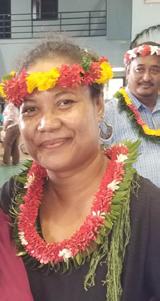
Anne-Marie Laamar made herstory last week when she became the first ever female to be sworn into office as Yap’s elected senator on January 9, 2023. Ms. Laamar was elected last November into the Yap State Legislature representing main island district, which has 6 seats in the Legislature. She is a wife and mother of 2 who loves to read and counts her blessings in her family and friends.
Anne-Marie is a Xavier High School graduate, and completed her Bachelor of Arts in International Relations from Grand Canyon University in Phoenix, Arizona in June 1999.
Anne-Marie is co-owner of a family business in construction and retail with more than 10 years of management experience. The company has grown to now include services in food service and logistics.
Prior to that, she worked at AYUW Services
Credit Union in Yap until 2014, where she helped managed the financial institution when it first opened its doors, eventually became the manager and helped set up the general operation and management procedures of the credit union.
Currently she is an active member of Yap Chamber of Commerce, Board of Directors working to promote the interest of the private sector through collaboration with the State Government leaders. She is also a member of the Board of Directors for Tamil Youth Organization and a co-founder of the Organization which is responsible for the fundraising, building and coordinating of the operation of Yap’s first elementary school cafeteria catering to students’ free lunches from locally grown and harvested food within the community free from government funding.
CONGRATULATIONS Anne-Marie Laamar
FSM Department of Health Supports Pohnpei State Supreme Court Marshals in Responding to Domestic Violence Offenses
On December 7th, 2022, the Marshals of the Pohnpei State Supreme Court completed a landmark five-module online workshop on domestic violence and gender inequality led by Assistant Secretary Stuard Penias (FSM Department of Health and Social Affairs) and facilitated by Sonali Owen, the FSM’s Family Protection Adviser (Pacific Women Lead Enabling Services). Staff Attorney Heather Lee provided legal expertise and facilitation support to Ms. Owen. The development of content and design was a collaborative effort between the Department of Health and Social Affairs and the Pohnpei State Supreme Court and utilized a unique approach that integrated legislative provisions, court procedures and domestic violence response considerations Participants in the program included Court Director Gustin Harris, Chief Marshal Tommy Aron, Deputy Marshal Lincoln Abraham, Deputy Marshal Brenson Solomon, Deputy Marshal Bernie Scaliem, Deputy Marshal Jason Etger, and Deputy Marshal Romencio Antreas.
Participants explored domestic violence, gender inequality, and harmful gender stereotyping (discrimination) in relation to their roles and work as Court Marshals. After reflecting on the physical, emotional, financial, and social impacts of domestic violence, participants developed
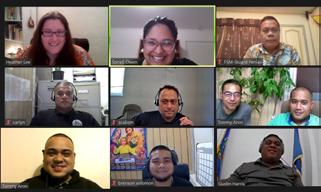
a draft questionnaire to be used when gathering information for pre-sentence reporting purposes which captures the nuanced ways in which domestic violence may affect survivors. After internal approval, this questionnaire will enter a pilot phase with ongoing adaptation, assessment, and review. Chief Marshal Aron summarized the training as follows: “As Court Marshals, one of our duties and responsibilities is to develop a presentence report for the Justices to assist them in determining a sentence for a criminal defendant. The training provided a high level of understanding to our Court Marshals on how to interview and collect information from survivors of family violence.”
The FSM Department of Health and Social Affairs celebrates this milestone work and looks forward to continuing to advance the goal of Elimination of Violence Against Women and Girls.
January 18 - 31, 2023 The Kaselehlie Press 21
China’s optimization of COVID-19 policies are science-based,
By Mr. ZHANG Weitao, Charge d'Affaires ad interim of the Chinese Embassy in the FSM
Kaselehlie! It’s my great pleasure to communicate with our friends in the FSM through The Kaselehlie Press. First of all, I would like to extend New Year greetings to all of you.

Over the past year, under the strategic guidance of H.E. Xi Jinping, President of People’s Republic of China, and H.E. David W. Panuelo, President of the Federated States of Micronesia, ChinaFSM relations have maintained sound and stable development, with increasing political mutual trust and deepening cooperation in various fields, bringing tangible benefits to the two countries and two peoples. In particular, in the face of the challenges of COVID-19, China and the FSM, as comprehensive strategic partners, have always understood and helped each other to overcome the difficulties, writing a touching story of fighting the pandemic with solidarity.
Last July, the FSM faced a grave situation in epidemic prevention due to community spread of COVID-19. Fortunately, under the strong leadership of President H.E David W. Panuelo, the FSM has successfully overcome the peak of the epidemic, gained important experience in fighting the epidemic, and made continuous economic and social recovery. During that period, Chinese Embassy in the FSM has joined hands with the FSM government and people, provided assistance to the best of its capability and made its due contribution to helping the FSM out of the shadow of the epidemic.
Many friends in the FSM may have noticed that the Chinese government has optimized and adjusted its COVID-19 policy. From January 8, 2023, China
Opinion Editorial
has started to manage COVID-19 with measures against Class-B instead of the more serious Class-A infectious diseases, shifting the focus of our response from stemming infection to caring for health and preventing severe cases, and taken a series of measures to better facilitate people-topeople exchanges between China and other countries. Nucleic acid tests and centralized quarantine will no longer be conducted on inbound travelers upon arrival. Passenger capacity limits on international flights have been removed.
The above mentioned measures are optimization of the epidemic prevention policy made by the Chinese government in light of the latest COVID-19 situation, based on scientific and rational analysis and assessment with a prudent approach. It is science-based, timely and necessary. The aim is to protect the lives and health of the people and reduce the impact of the epidemic on economic and social development to the maximum extent possible. This is also important from a strategic and long-term perspective for effectively coordinating COVID-19 response with economic and social development and safeguarding the fundamental interests of the greatest majority of the people.
China has been the most successful country in fighting the epidemic. Since COVID-19 began, the Chinese government has always put the people and lives first, just as the FSM government has done. We have poured all our efforts and resources into protecting the life and health of every Chinese during the toughest time.
Over the past three years, we have effectively responded to five global COVID-19 waves and avoided widespread infections with the original strain and the Delta variant, which are relatively more pathogenic than the other variants. We have greatly reduced the number of severe cases and deaths, and bought precious time for the research, development and application of vaccines and therapeutics, and for getting medical supplies and other resources ready. China has managed to maintain the lowest rates of COVID-19 severe cases and deaths, while people’s average life expectancy has increased from 77.3 to 78.2 years in 2021. China’s tremendous achievements in the fight against COVID-19 have won high praise and unanimous recognition from the international community, including the WHO.
In response to the pandemic, China has taken a holistic approach toward disease control and economic development, adapting response measures by keeping
them science-based, targeted, and responsive to the evolving situation, to minimize the impact on people’s daily life as well as overall economic and social development. China’s economy grew by an average of 5.1% in the year 2020 and 2021, one of the highest in major global economies. China also moved up six places in Human Development Index (HDI) ranking despite the decline of the global HDI for two consecutive years.
It should come as no surprise that countries would go through a period of adaptation as they shift gears in COVID-19 policy. China is no exception. However, China has better foundations for adjusting its epidemic prevention policies.
First, the incubation period of the virus is shorter and the pathogenicity is significantly reduced, and it will gradually evolve into a common respiratory infectious disease.
Second, although the number of infected people is large, asymptomatic infections and mild cases are the majority, and the occurrence of severe cases and mortality is extremely low.
Third, China has inoculated 1.4 billion people with more than 3.4 billion doses of COVID-19 vaccine, covering 92% of the total population. Over 90% of the population have been fully vaccinated. China has 13 types of COVID-19 vaccines available, with an annual vaccine production capacity of more than 7 billion doses. Meanwhile, China has taken multiple measures to increase drug production capacity, which could basically meet the market demand, and the supply of antipyretic and anti-influenza medicines has been significantly improved. China is actively engaged in international medical co-operation and has approved the import of COVID-19 treatment drugs produced by Pfizer and other foreign manufacturers. At the moment, China’s epidemiological situation is generally stable and under control. Recently, Beijing, Guangzhou and other places have passed the peak of the epidemic. Life and work are gradually coming back to normal, travel around the country is warming up, and the familiar hustle and bustle has come back to the streets and alleys in China. We have full capability and confidence in the final victory over the epidemic.
Some Western media have discredited China’s COVID-19 policy adjustment, alleging that China has changed its COVID-19 response philosophy and no longer values people’s lives. This type
of rhetoric is driven by bias, intended to smear China and politically motivated. There is no truth in such rhetoric, which simply misses the facts.
In fact, China has not only safeguarded the lives and health of its own people, but also made important contributions to the global fight against COVID-19. China has been sharing relevant information and data with the international community in an open, transparent and responsible manner. Over the past three years, China has carried out over 60 technical exchanges with WHO. China is also doing its best to share the genome data of the virus via the Global Initiative on Sharing Avian Influenza Data (GISAID).
China was the first to make vaccines a global public good. It has provided more than 2.2 billion doses of COVID-19 vaccine to more than 120 countries and international organizations, hundreds of billions of anti-pandemic items to 153 countries and 15 international organizations. China has launched over 300 activities on technical exchange for COVID-19 prevention and control with 180 countries and regions, as well as over 10 international organizations, and sent 38 medical teams to 34 countries, to help the international community respond to the epidemic. I believe our friends in the FSM have also witnessed what China has done in the past three years. We have provided many batches of anti-epidemic supplies and cash assistance to the FSM, playing an active role in helping the FSM overcome the difficulties posed by the COVID-19 pandemic.
What’s past is prologue. As China adjusts its epidemic prevention policy, it is widely predicted that the Chinese economy will show a remarkable momentum of recovery in 2023, which will bring more opportunities to the whole world.
Looking ahead to the new year, I am confident that China will overcome the pandemic, pursue greater openness and achieve steady economic recovery, thus creating broader space for ChinaFSM cooperation. China looks forward to working with the FSM to actively implement the important consensus reached between the two leaders, seize the opportunities brought by China’s development, deepen bilateral practical cooperation and lift China-FSM Comprehensive Strategic Partnership to a new level, so as to deliver greater benefits to our two countries and two peoples.
The Kaselehlie Press January 18 - 31, 2023 22
timely and effective
Pohnpei Department of Education gets four new school buses
January 13, 2023
Pohnpei— This afternoon, Aspen Apis of A-Export and Trading Company turned over four recently arrived school buses that his company facilitated. Pohnpei State purchased the school buses at a cost of $240,000 using Education Sector grant funds under the Compact of Free Association.
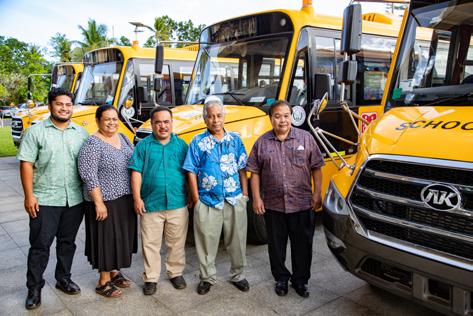
Pohnpei’s Director Stanley Etse said Wapar, Mand, Lukop, and Ohmine Elementary schools will each receive one of the new buses.
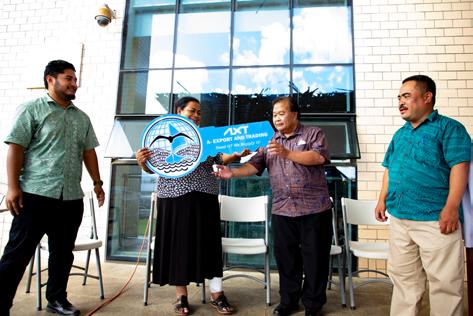
The Australian Embassy is seeking applications from suitably qualified persons for two full-time positions.
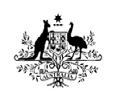
Public Affairs and Research Officer

This position plays an important role at the Embassy, researching and providing advice to the Ambassador and staff on key policies and developments in the FSM. It also manages the Embassy’s public affairs and social media programs, helping to promote Australia’s partnership with the FSM. It requires well developed interpersonal, communication and social media skills and the ability to work productively and energetically as part of a small upbeat team.
The salary range is US$21,728 – US$25,418 per annum.
This position plays an important role at the Embassy, researching and providing advice to the Ambassador and staff on key policies and developments in the FSM. It also manages the Embassy ’s public affairs and social media programs, helping to promote Australia ’s partnership with the FSM. It requires well developed interpersonal, communication and social media skills and the ability to work productively and energetically as part of a small upbeat team.
Executive/Office Assistant
The salary range is US$21,728 – US$25,418 per annum
This is an exciting and important position which works as part of a small, upbeat team focused on ensuring strong ties between Australia and the FSM. It provides administrative support to the Ambassador as well as organising events and contributing to the broader work of the Embassy. This position requires good communication, coordination and IT skills, attention to detail and the ability to work effectively in a team.
Executive/Office Assistant
The salary range is US$17,065 – US$19,963 per annum.
This is an exciting and important position which works as part of a small, upbeat team focused on ensuring strong ties between Australia and the FSM. It provides administrative support to the Ambassador as well as organising events and contributing to the broader work of the Embassy. This position requires good communication, coordination and IT skills, attention to detail and the ability to work effectively in a team.
The salary range is US$17,065 – US$19,963 per annum
Both positions are full time two-year contracts. The contracts may be extended on the basis of need and performance. The application forms, including the duty statements and selection criteria can be downloaded at: www.fsm.embassy.gov.
au For more information, please contact phpi.mail@dfat.gov.au
Application closing date for both positions is 5pm Friday 10 February 2023.
Both positions are full time two year contracts. The contracts may be extended on the basis of need and performance. The application forms, including the duty statements and selection criteria can be downloaded at: www.fsm.embassy.gov.au For more information, please contact
phpi.mail@dfat.gov.au


January 18 - 31, 2023 The Kaselehlie Press 23
Australian Embassy Pohnpei
The Australian Embassy is seeking applications from suitably qualified persons for two full time positions.
Public Affairs and Research Officer
Japan Government presents $252,000 for construction of gymnasium at Saladak Elementary School
Pohnpei Enginkehlap News
January 5, 2023
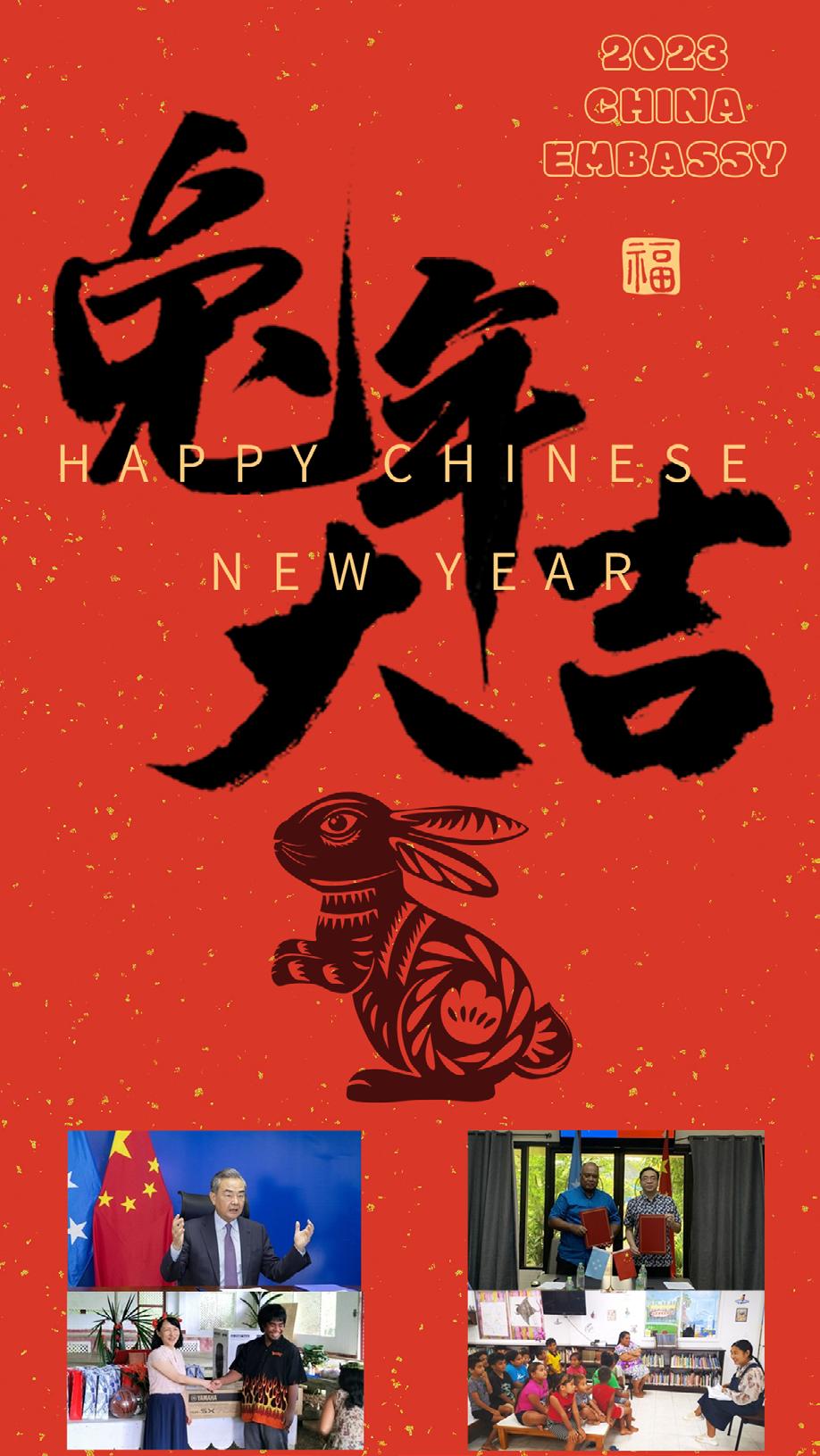

Pohnpei—On January 5, 2023, Governor Oliver attended a ceremony at the Embassy of Japan in Kolonia for the turnover of a $252,000 cheque from the Embassy of Japan to the Pohnpei State Government, Department of Education. The amount which was sourced from the Embassy of Japan’s Grant Assistance for Grassroots human security project will go towards the construction of a gymnasium at the Saladak Elementary School in U.

In his remarks, the Ambassador of Japan to the Federated States of Micronesia (FSM), H.E. Hisashi Michigami expressed his gratitude and appreciation for the opportunity through this project to contribute to the economic development and welfare of the people of the FSM, particularly in U. Ambassador Michigami noted that in addition to having a place for children to play during the rain, the gymnasium will also benefit the community as a site for meetings and emergency shelter. Ambassador Michigami ended his remarks with the good news that Japan International Cooperation Agency (JICA) volunteers will be returning soon to the FSM to assist with other projects and technical assistance and hoped that exchanges between our people will be back to normal.
Governor Oliver delivered closing remarks for the ceremony echoing Ambassador Michigami’s remarks on the great benefits of the gymnasium to the people of U and Pohnpei. He expressed his sincere gratitude to Ambassador Michigami and the staff of the Japan Embassy for all their work and assistance to the people of Pohnpei over the years including the Palikir Elementary School project and for upcoming projects like the Pohnpei Port expansion and Nan Madol Information Center projects. He acknowledged the work of the Overseas Development Assistance (ODA) Coordinator, Ms. Shirley Ann Ligohr, and her counterparts at the Japanese Embassy for their coordination and cooperation on this project.
Also present for the ceremony was the Speaker of the 10th Pohnpei Legislature, Marvin T. Yamaguchi, Secretary of the FSM Department of Finance Administration, Hon. Eugene Amor, Pohnpei Senator Sonster Edgar, and Pohnpei Senator Stevenson Joseph, Chief Minister of U, Rofino Primo and his wife, Speaker of U Council Olter Andon, Principal of Saladak Elementary School, Mr. Joseph Amor, Director of the Department of Treasury and Administration, Ms. Christina Elnei, Acting Director of the Department of Education Mr. Peter Ramirez, Public Affairs Officer Mr. Peteriko Hairens, Local Government Liaison Officer Ms. Suannrida Ladore, Protocol Officer and Master of Ceremonies, Mr. Emerson Eperiam.
The Kaselehlie Press January 18 - 31, 2023 24

























 U.S. Embassy Kolonia
U.S. Embassy Kolonia












